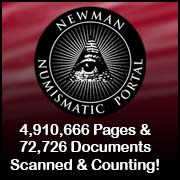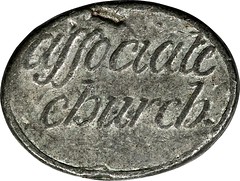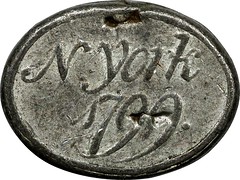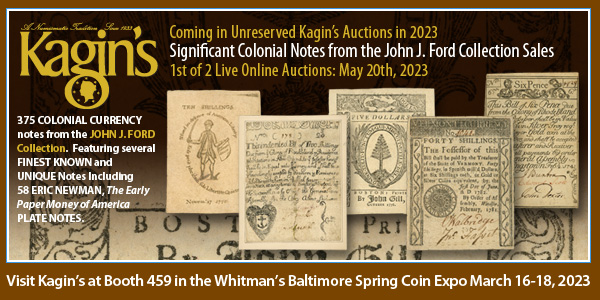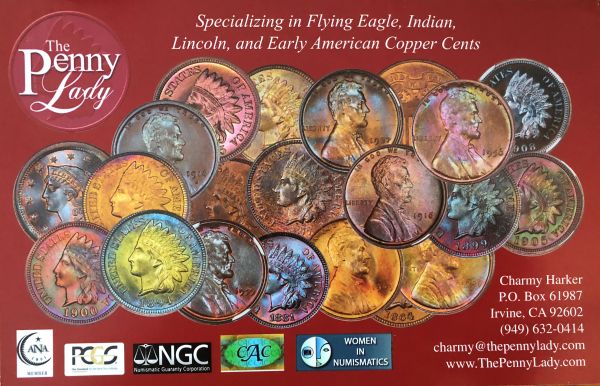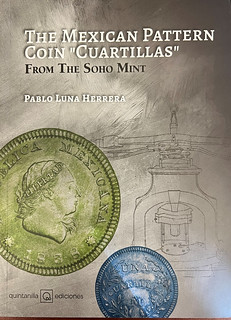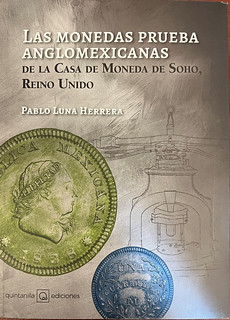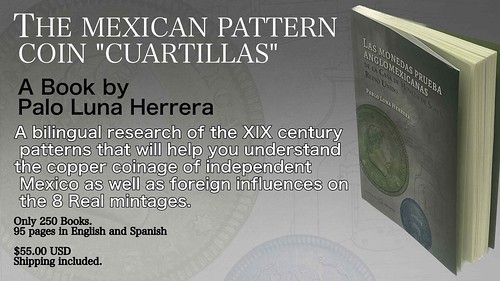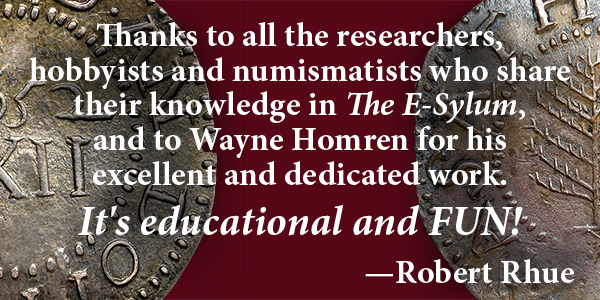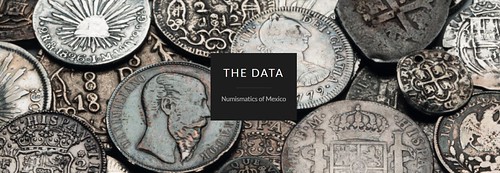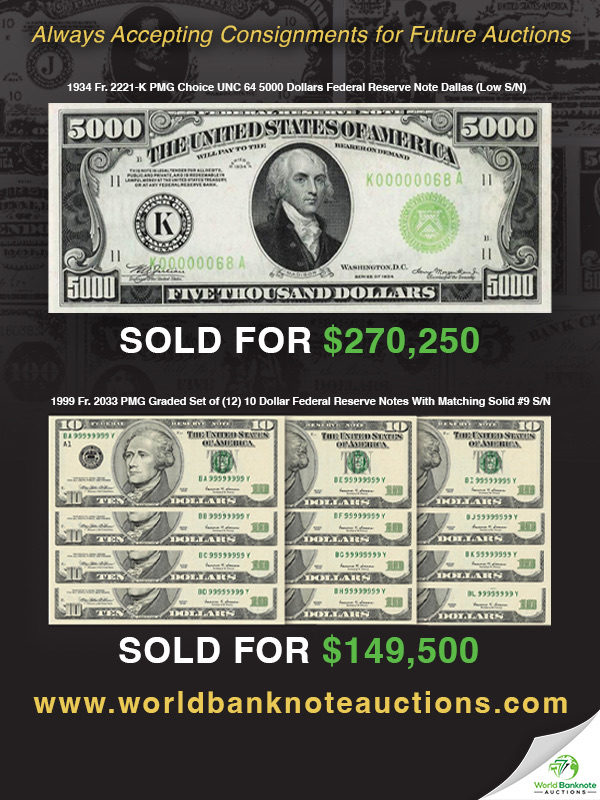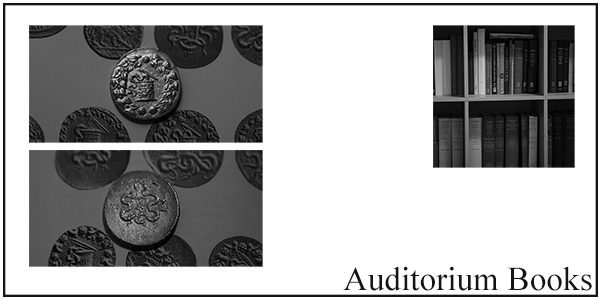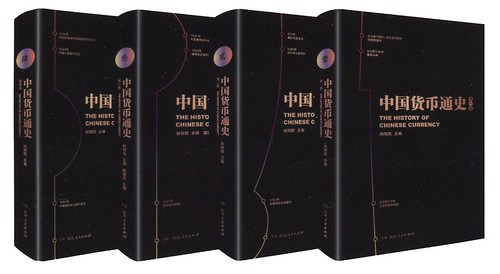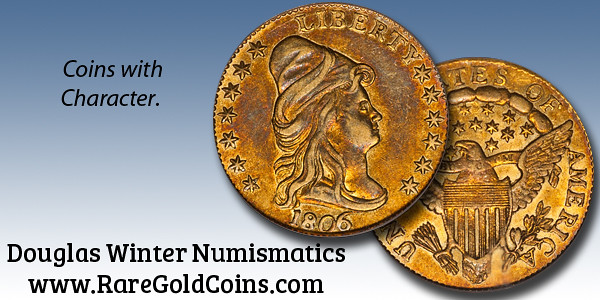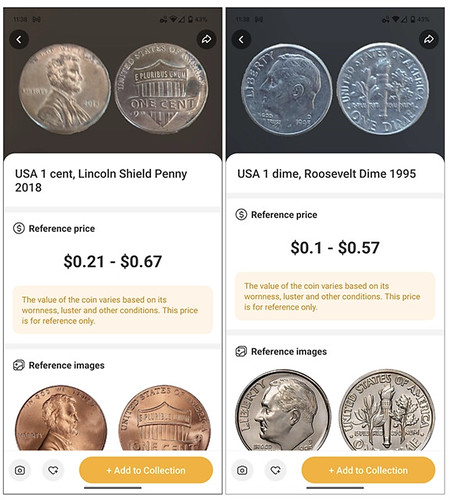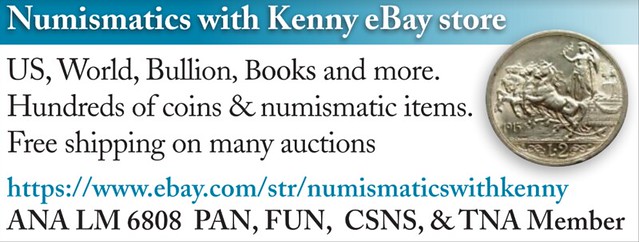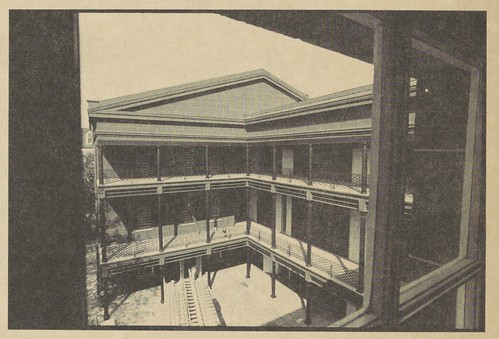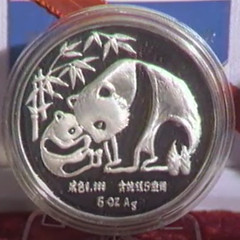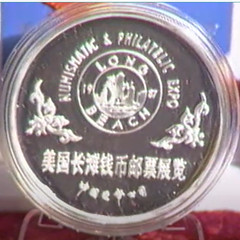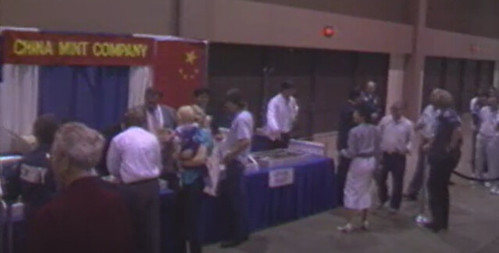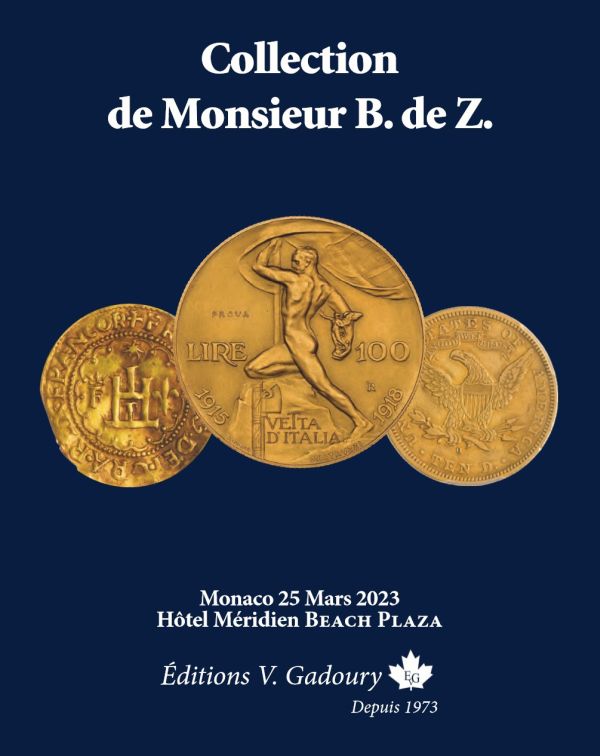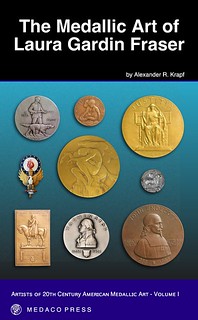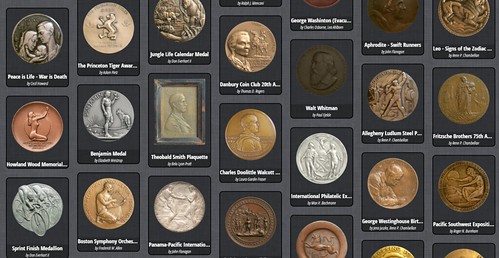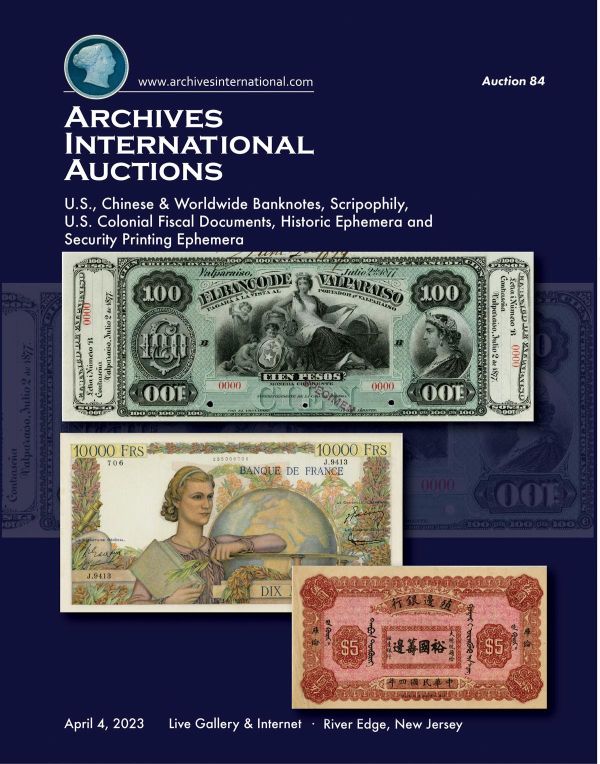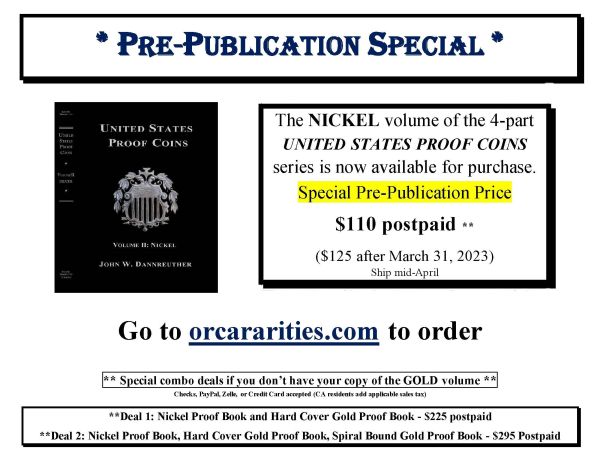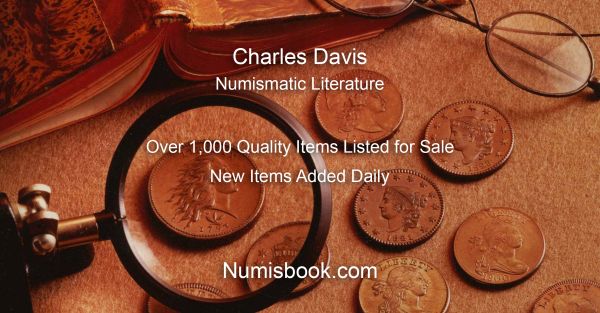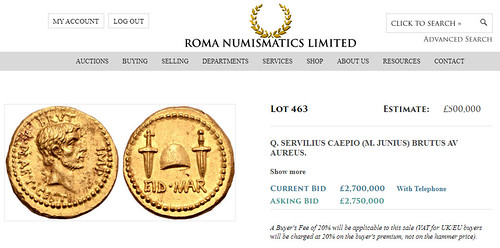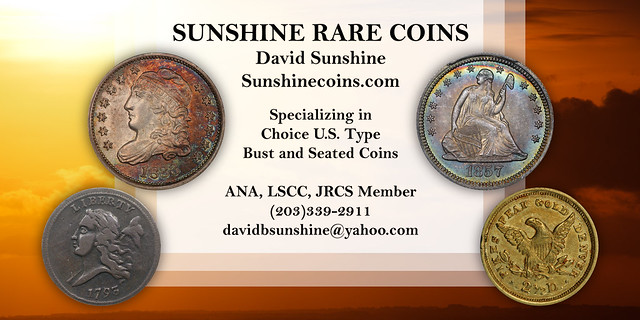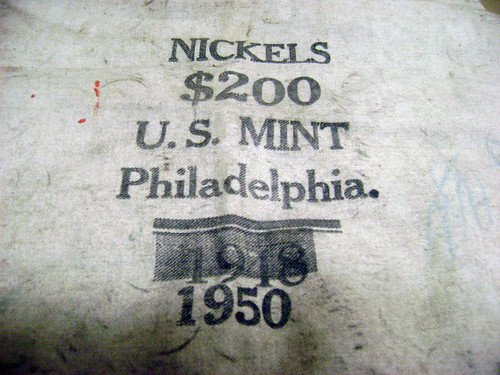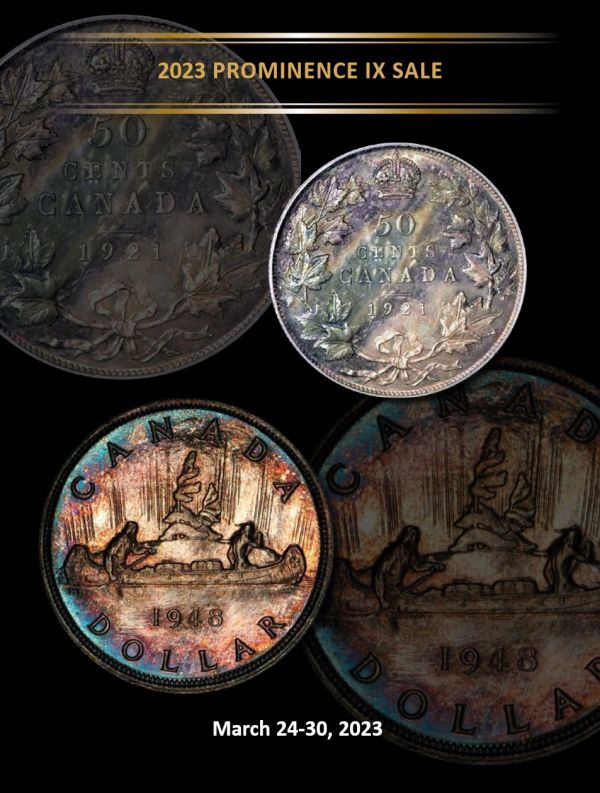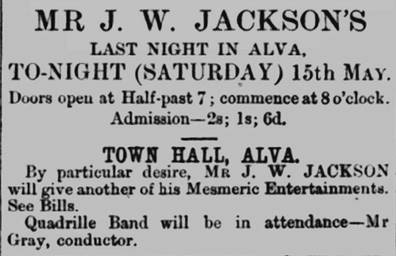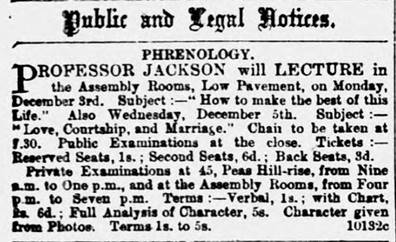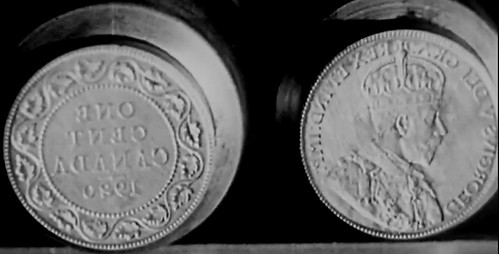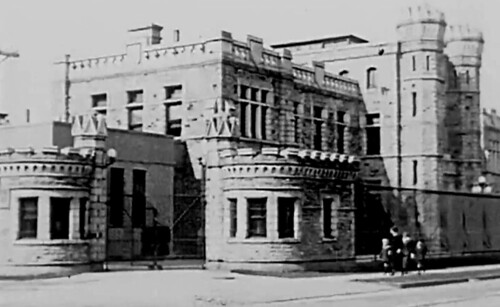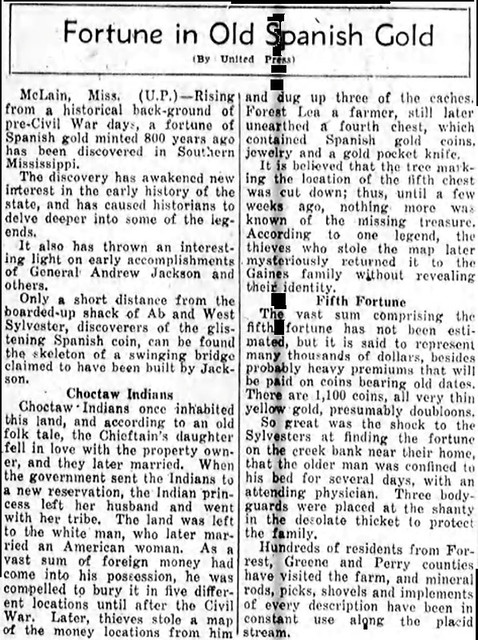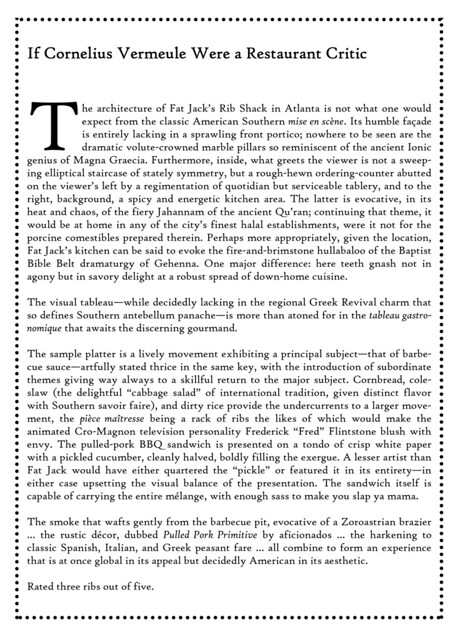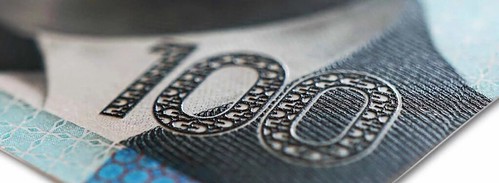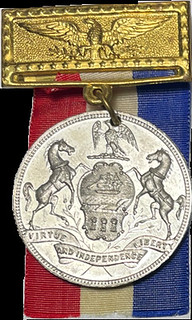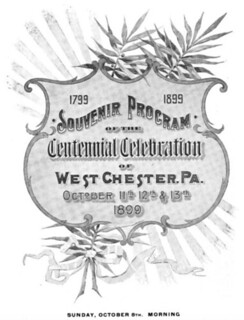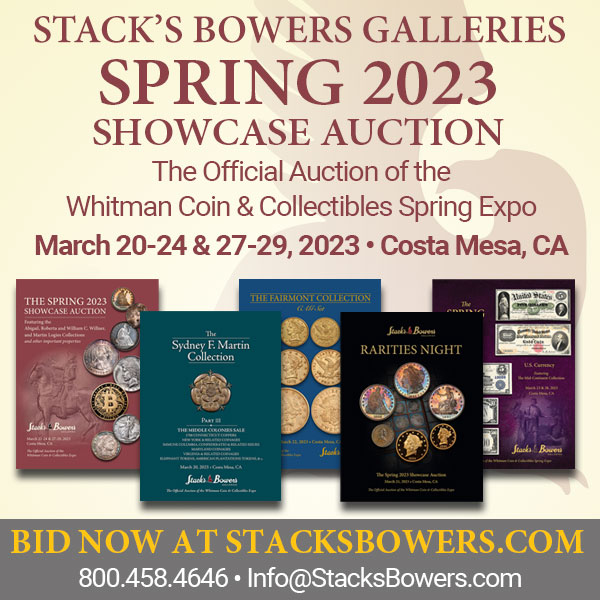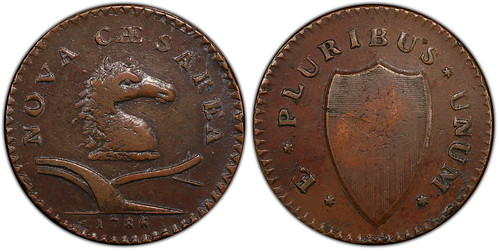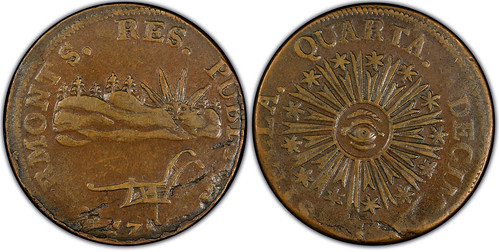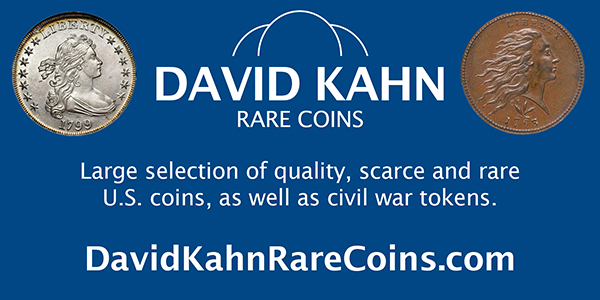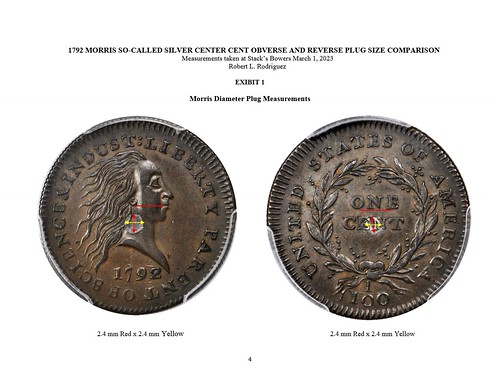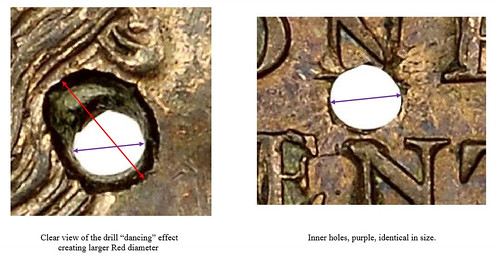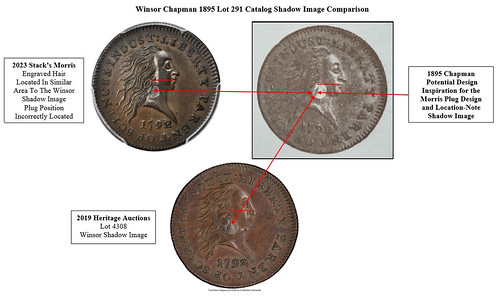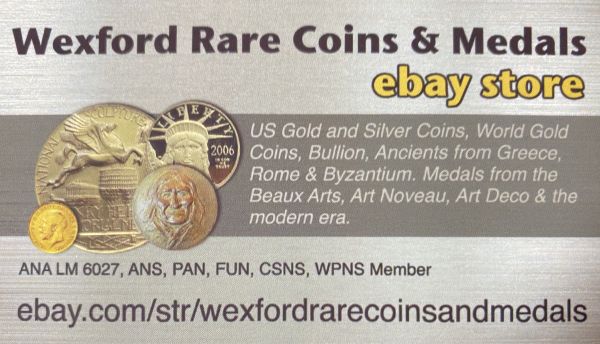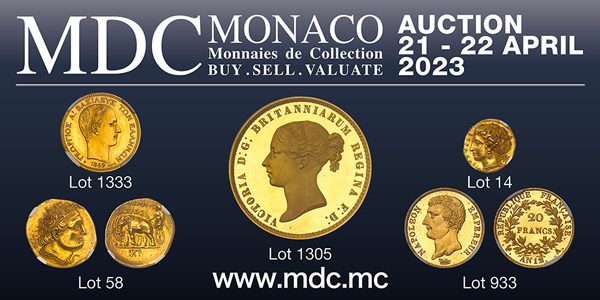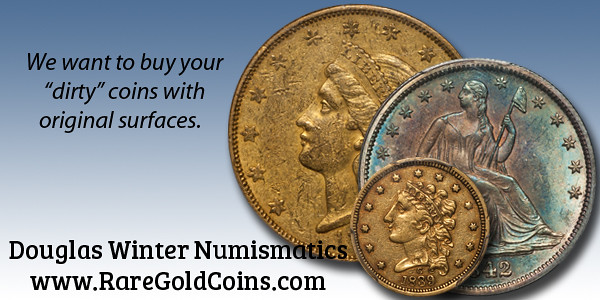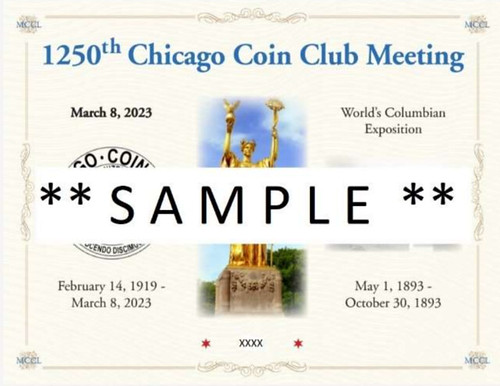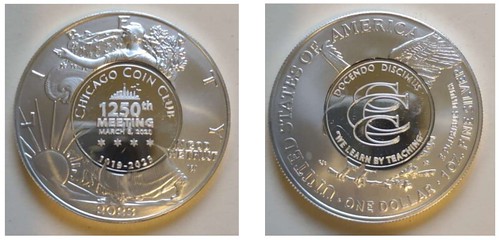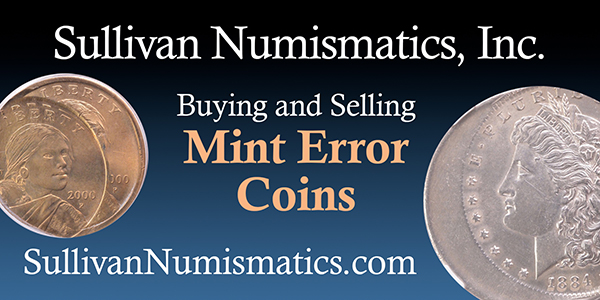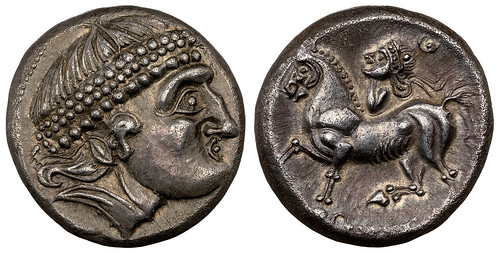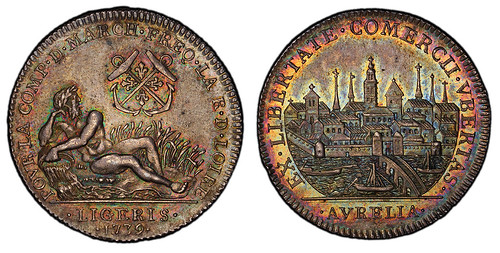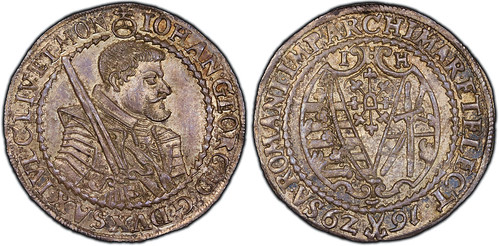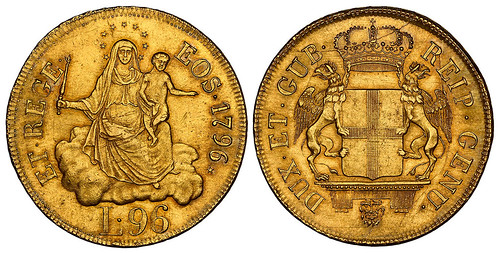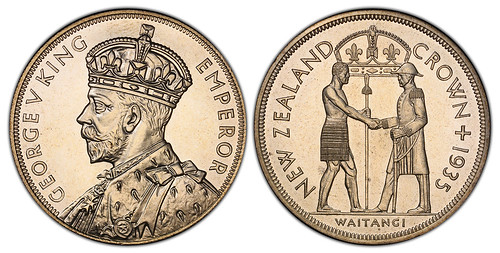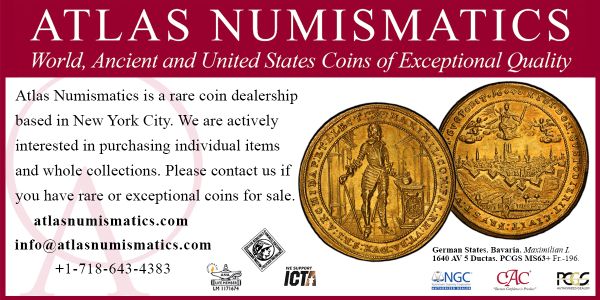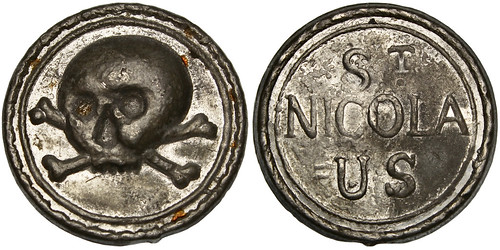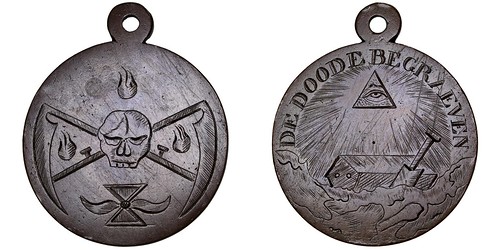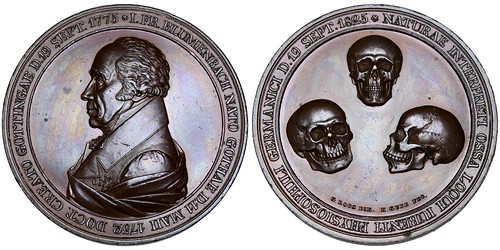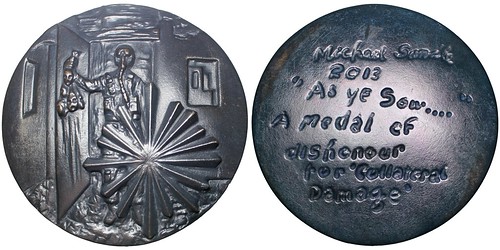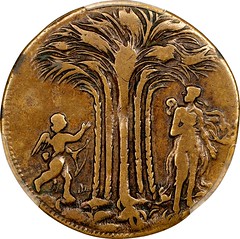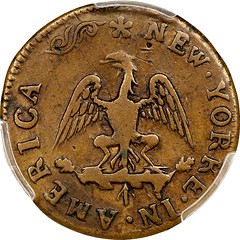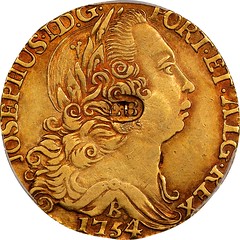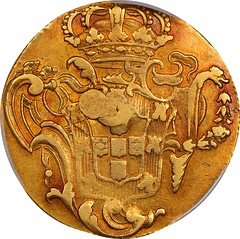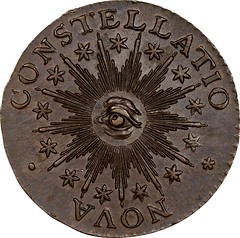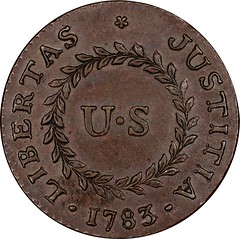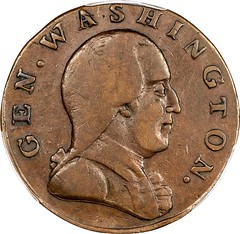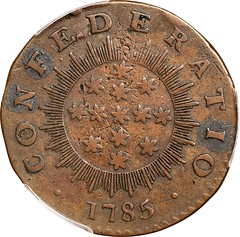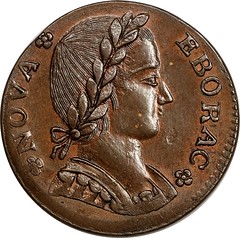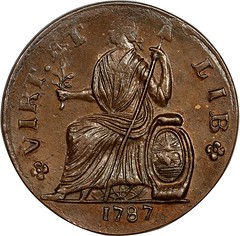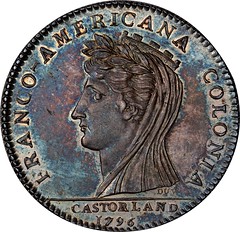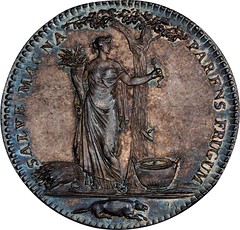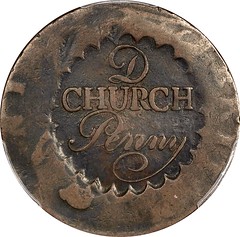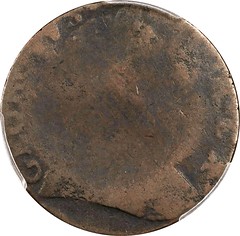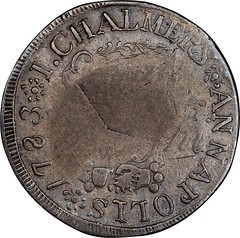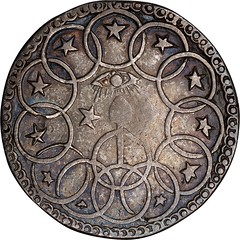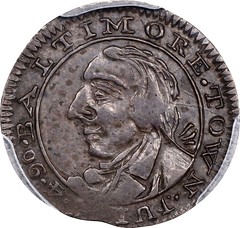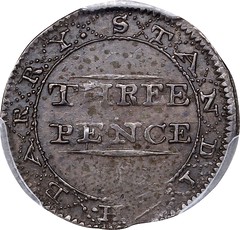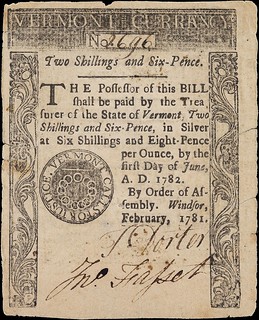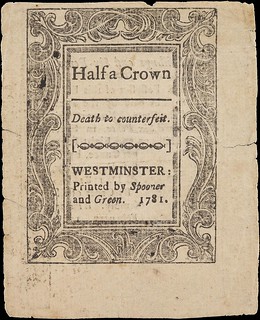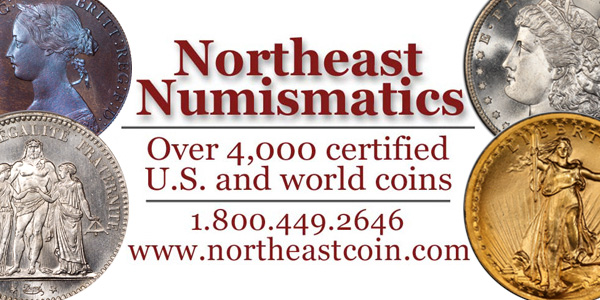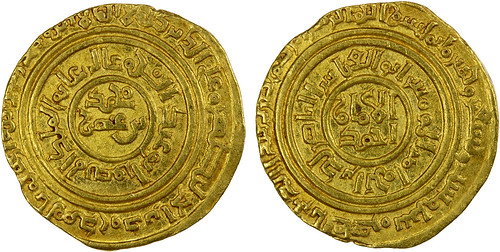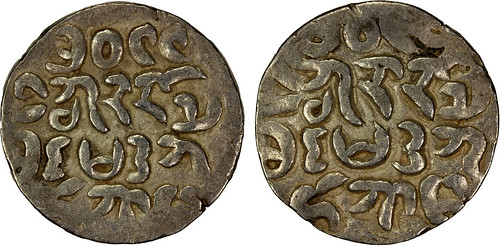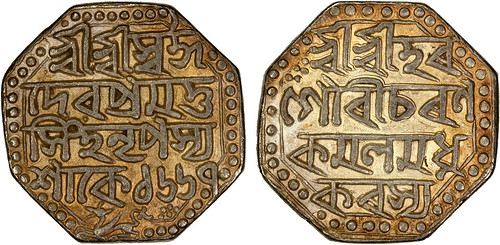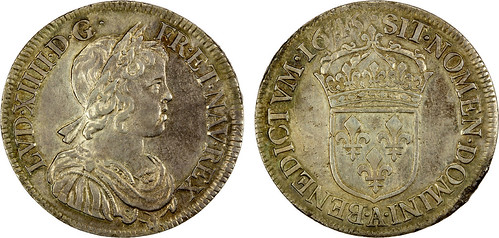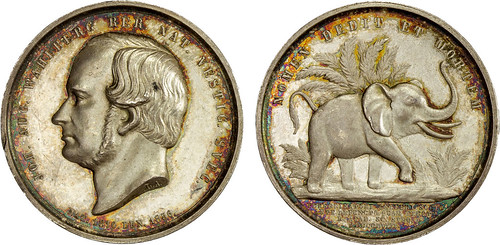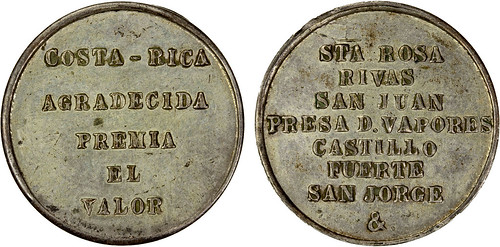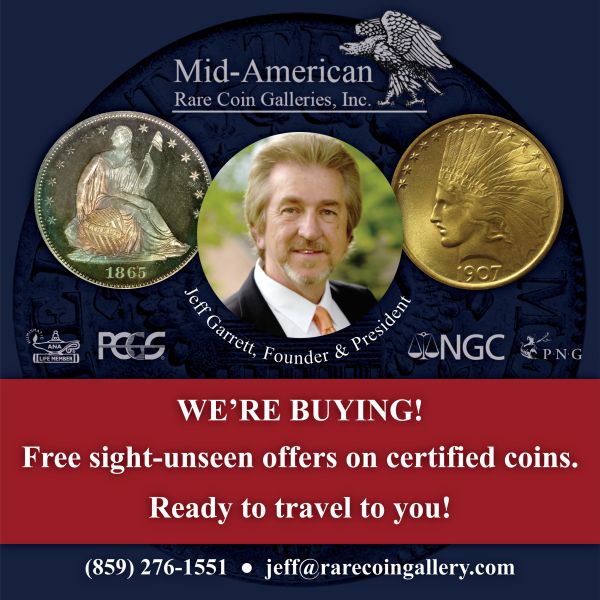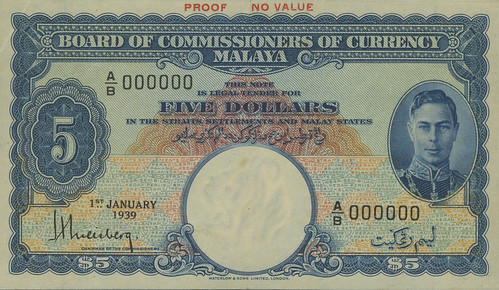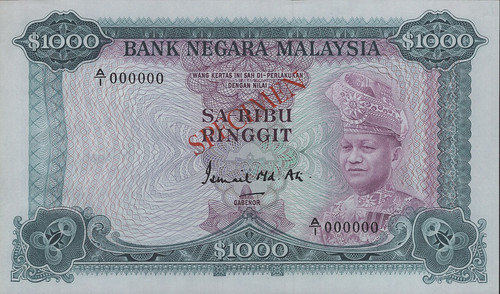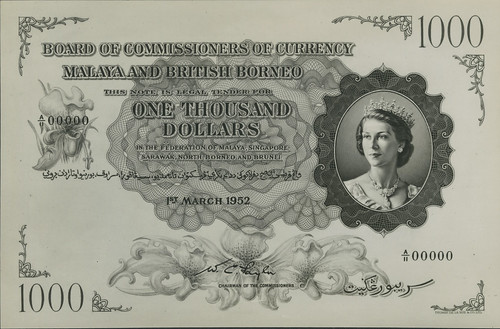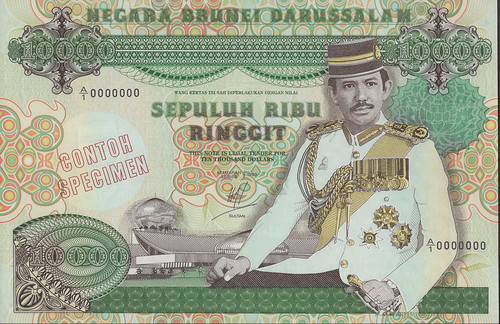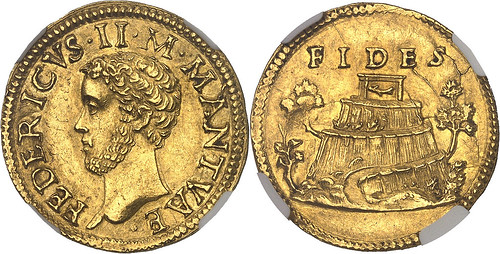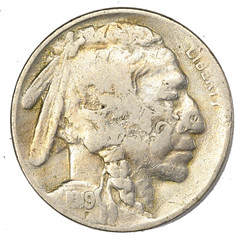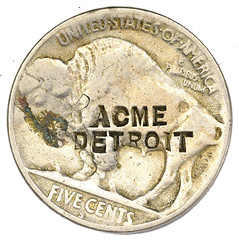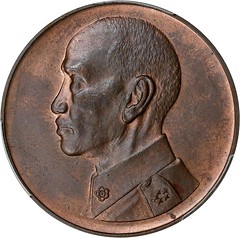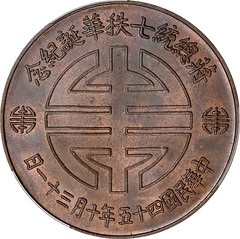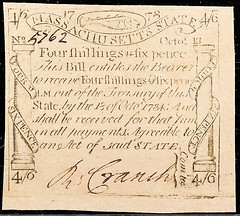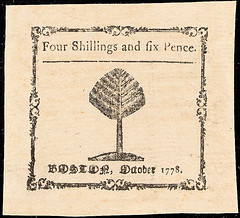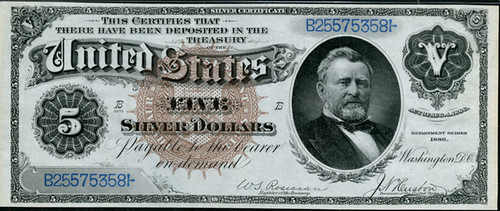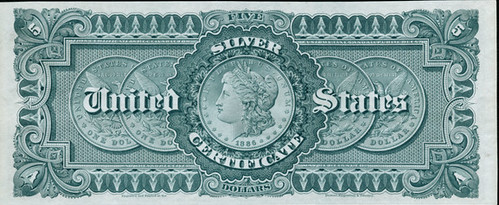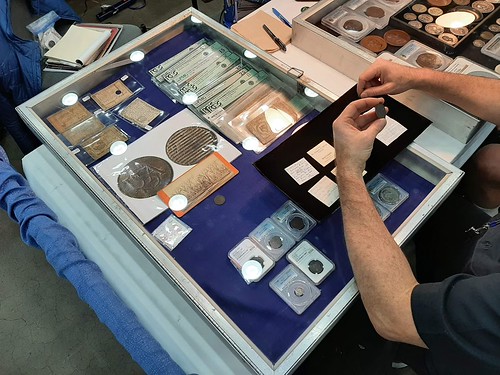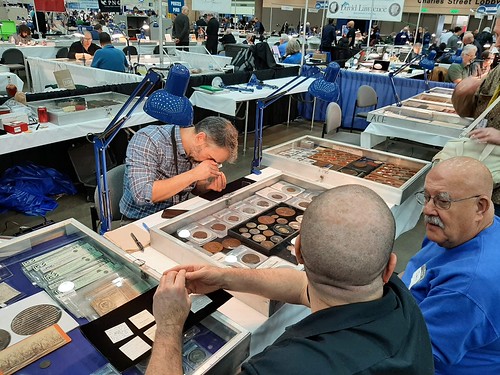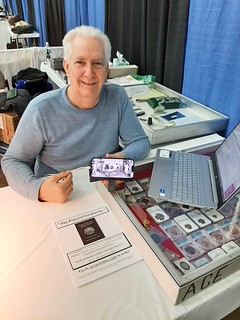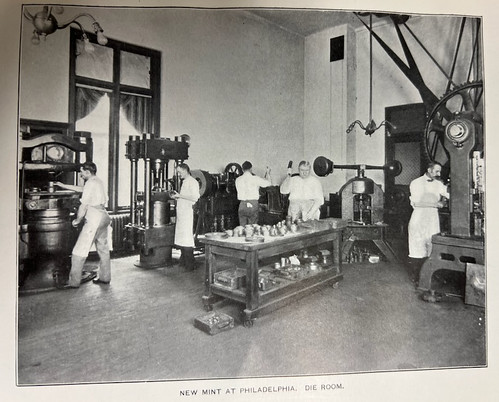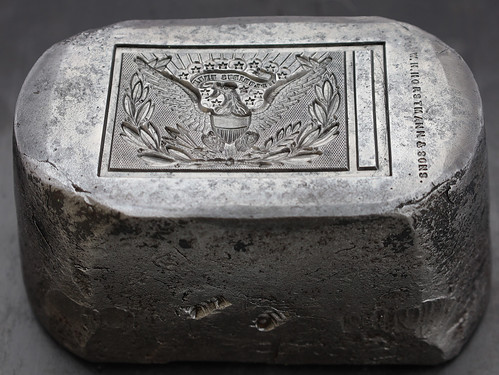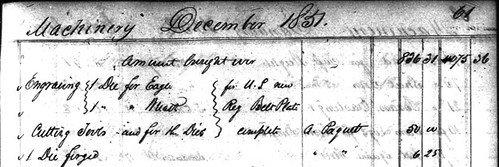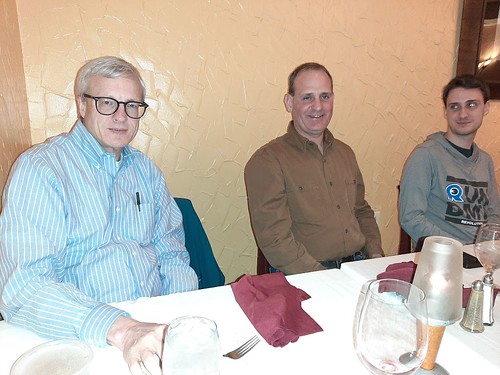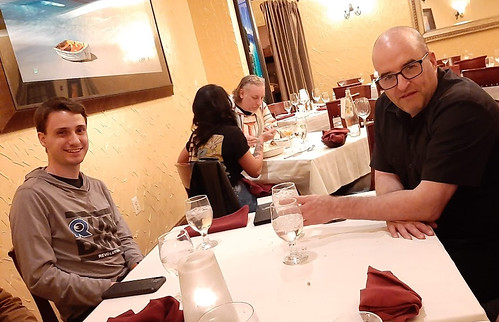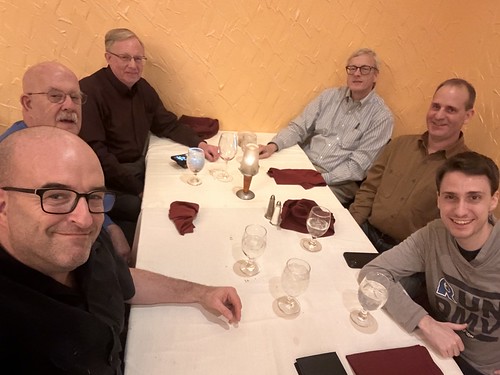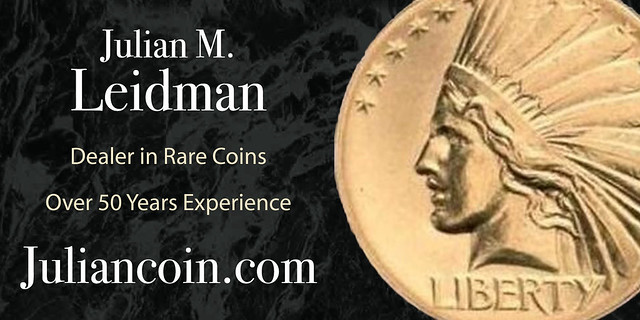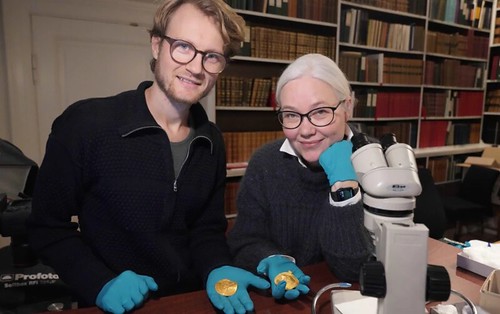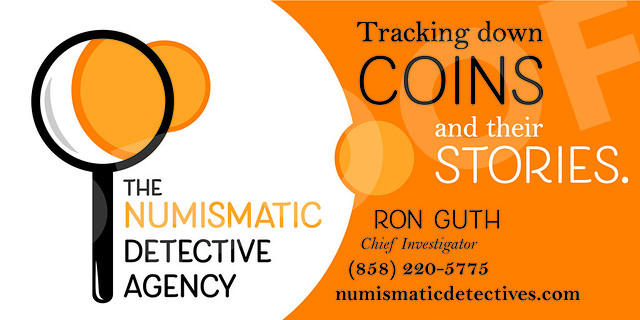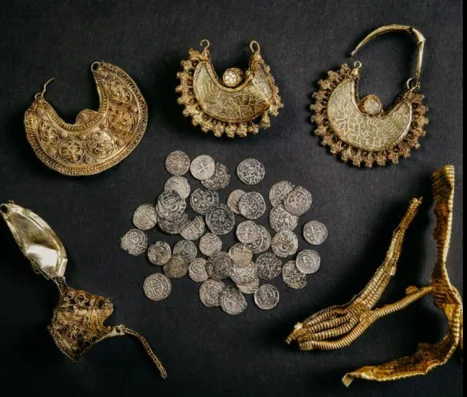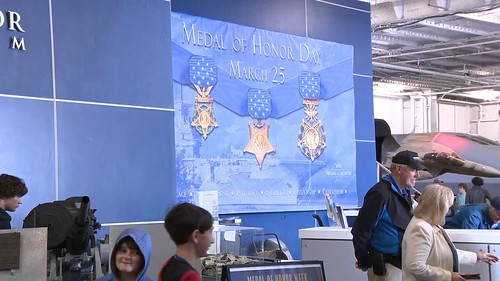
Visit our NBS Sponsors




About UsThe Numismatic Bibliomania Society is a non-profit association devoted to the study and enjoyment of numismatic literature. For more information please see our web site at coinbooks.org SubscriptionsThose wishing to become new E-Sylum subscribers (or wishing to Unsubscribe) can go to the following web page link MembershipThere is a membership application available on the web site Membership Application To join, print the application and return it with your check to the address printed on the application. Print/Digital membership is $40 to addresses in the U.S., and $60 elsewhere. A digital-only membership is available for $25. For those without web access, write to: Charles Heck, Treasurer AsylumFor Asylum mailing address changes and other membership questions, contact Chuck at this email address: treasurer@coinbooks.org SubmissionsTo submit items for publication in The E-Sylum, write to the Editor at this address: whomren@gmail.com BUY THE BOOK BEFORE THE COINSale CalendarWatch here for updates! |
- WAYNE'S WORDS: THE E-SYLUM MARCH 19, 2023
- NBS BIBLIOTALK PODCAST WITH AKIO LIS
- NEW BOOK: THE MEXICAN PATTERN COIN CUARTILLAS
- NEW BOOK: MEXICAN COIN PATTERNS OF THE 20TH CENTURY
- NEW BOOK: PAPER MONEY OF LUXEMBOURG
- BOOK REVIEW: THE HISTORY OF CHINESE CURRENCY
- APP REVIEW: COINSNAP
- NEW ORLEANS MINT RESTORATION ON NNP
- VIDEO: CHINA MINT LONG BEACH PANDA-MONIUM
- AMERICAN MEDALLIC ART BOOK SERIES PLANNED
- 2022 ANA CLUB PUBLICATIONS COMPETITION
- 2023 COLLIER PRIZE APPLICATIONS ACCEPTED
- IAPN STATEMENT ON FALSE PROVENANCES
- MORE ON OVERPRINTED MINT BAGS
- MORE ON PROFESSOR JACKSON
- NOTES FROM E-SYLUM READERS: MARCH 19, 2023
- PCGS REDEFINES CONFEDERATION-ERA COPPER COINS
- UPDATE ON THE MORRIS 1792 SILVER CENTER CENT
- VOCABULARY TERM: MODEL
- HELEN MANCHESTER GATES (1868-1950)
- CHICAGO COIN CLUB 1250TH MEETING
- ATLAS NUMISMATICS SELECTIONS: MARCH 19, 2023
- NUMISMAGRAM MEDAL SELECTIONS: MARCH 19, 2023
- MORE MARTIN COLLECTION PART III HIGHLIGHTS
- STEPHEN ALBUM INTERNET AUCTION 19
- GOON COLLECTION OF BRITISH MALAYAN BANKNOTES
- NUMISMATIC NUGGETS: MARCH 19, 2023
- WAYNE'S NUMISMATIC DIARY: MARCH 19, 2023
- COIN WITH OLDEST DEPICTION OF TEMPLE MENORAH
- VIKING GOLD BRACTEATE OF ODIN
- NETHERLANDS DETECTORIST UNEARTHS COIN HOARD
- MEDAL OF HONOR MUSEUM TO EXPAND
- LOOSE CHANGE: MARCH 19, 2023
- CASPAR WISTAR'S ODD COLLECTION
- FEATURED WEBSITE: TOKEN CORRESPONDING SOCIETY
Click here to read the thin version on the web
Click here to subscribe
Click here to access the complete archive
To comment or submit articles, reply to whomren@gmail.com
Content presented in The E-Sylum is not necessarily researched or independently fact-checked, and views expressed do not necessarily represent those of the Numismatic Bibliomania Society.
WAYNE'S WORDS: THE E-SYLUM MARCH 19, 2023
 New subscribers this week include:
Dan Runze, courtesy of Pete Smith;
and
Pablo Luna Herrera.
Welcome aboard!
New subscribers this week include:
Dan Runze, courtesy of Pete Smith;
and
Pablo Luna Herrera.
Welcome aboard!
Thank you for reading The E-Sylum. If you enjoy it, please send me the email addresses of friends you think may enjoy it as well and I'll send them a subscription. Contact me at whomren@gmail.com anytime regarding your subscription, or questions, comments or suggestions about our content.
This week we open with a new podcast, three new books, two reviews, updates from the Newman Numismatic Portal, the ANA, ANS, IAPN and more.
Other topics this week include Mexican patterns, Luxenbourg paper money, Chinese currency, the New Orleans Mint, the China Mint, the Chicago Coin Club, fixed price and auction offerings, my numismatic diary, coin finds, and the Medal of Honor museum.
To learn more about the ANA Library, CoinSnap, Laura Gardin Fraser's medals, the Collier Prize in Ancient Numismatics, Seigfried Otto, the Waitangi Crown, the New Yorke in America token, the Albany Church Penny, British Malayan banknotes, Codfish notes, dies and stolen relics, read on. Have a great week, everyone!
Wayne Homren
Editor, The E-Sylum
NBS BIBLIOTALK PODCAST WITH AKIO LIS
The latest episode of the Numismatic Bibliomania Society podcast is now available for listening. It's on the NBS web site but also available elsewhere. Vice-President/Secretary Len Augsburger provided this report. -Editor
NBS Podcast Interviews ANA Library Manager Akio Lis
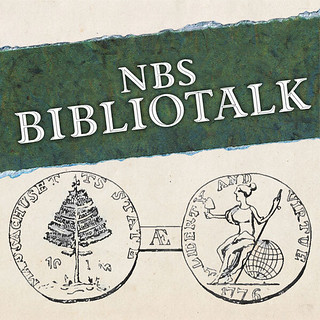 The latest episode of the NBS Bibliotalk podcast,
The latest episode of the NBS Bibliotalk podcast, The ANA Library, with Akio Lis
is now available on the NBS website and other popular podcasting platforms such as Buzzsprout. In this episode, Akio Lis, ANA Library Manager, speaks about the ANA library and his numismatic journey.
Although a lifelong collector, Akio comes from a musical background, such as other numismatists including Gene Hessler, Roger Burdette, and Shanna Schmidt. After graduating with a performance degree in oboe, Akio worked in the ANA library as an intern and volunteer and eventually joined full time as library manager in October 2021. In this episode, Akio covers all aspects of the ANA library operation, including the ever-popular Summer Seminar book sale. The NBS podcast is produced every other month by Lianna Spurrier of Numismatic Marketing.
Link to The ANA Library, with Akio Lis
on the NBS podcast page:
https://www.coinbooks.org/resources/podcast.html
NEW BOOK: THE MEXICAN PATTERN COIN CUARTILLAS
Pablo Luna Herrera published a new book on the Mexican Pattern Coin "Cuartillas" from the Soho Mint. It's available in both English and Spanish. -Editor
Title: The Mexican Pattern Coin "Cuartillas" from the Soho Mint (Las Monedas Prueba Anglomexicanas de la Casa de Moneda de Soho, Reino Unido)
Author: Pablo Luna Herrera
Dimensions: 5.5 x 8.5 in
Pages: 190 (both languages)
Cover: Softcover
Year: 2022
Language: Spanish-English
Edition: 250 copies
Summary: This essay analyzes the influence of British entrepreneurs in Mexican currency and the establishment of mints; regarding a proposal of multiple copper pattern coins from 1828 to 1838. Special emphasis is made to the turbulent and chaotic domestic copper coinage on the period addressed. This is the first investigation that disclose new information of a group of coins not mentioned in any bibliography in nearly 200 years.
For more information, or to order, see:
The Mexican Pattern Coin Cuartillas by Pablo Luna Herrera 129277
(https://worldnumismatics.com/product/the-mexican-pattern-coin-cuartillas-by-pable-luna-herrara/)
NEW BOOK: MEXICAN COIN PATTERNS OF THE 20TH CENTURY
Another new book by Pablo Luna Herrera catalogs Mexican coin patterns of the 20th century. Unfortunately, it's already out of print. Would any of our readers care to contribute a review? -Editor
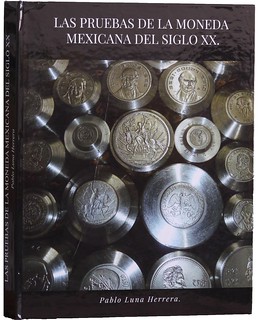 Title: Las Pruebas de la Moneda Mexicana del Siglo XX (The Mexican Coin Patterns of the XXth Century)
Title: Las Pruebas de la Moneda Mexicana del Siglo XX (The Mexican Coin Patterns of the XXth Century)
Author: Pablo Luna Herrera
Dimensions: 8.5 x 11 in.
Pages: 408
Cover: Hardcover
Year: 2019
Language: Spanish
Edition: 150 copies
Summary: This is the first investigation that describes from different approaches (numismatic, legal, economic, social, historical) nearly 400 different pattern coins of the XXth century, not previously studied, nearly all with color photographs, some with mintages available. The classification number used is now the official reference for NGC & PCGS, also, the book has received multiple mentions and recognitions in Mexico and United States.
Status: Sold out, sometimes available in numismatic auctions.
For more information on Mexican numismatics, see Pablo's blog at https://eldatonumismatico.wordpress.com/ . -Editor
NEW BOOK: PAPER MONEY OF LUXEMBOURG
A new book on the paper money of Luxembourg has been published. Here's a Google-translated article from the Geldscheine online newsletter. -Editor
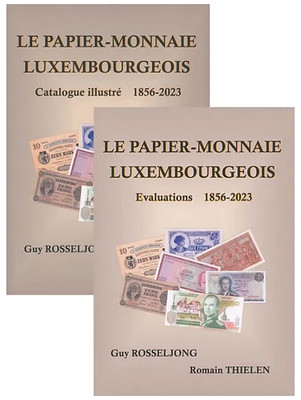 Guy Rosseljong | Romain Thielen:
Guy Rosseljong | Romain Thielen:
Le Papier-Monnaie Luxembourgeois
Catalog illustré 1856–2023 &
Evaluations 1856-2023
Catalog:
520 pages, format 14.8 cm x 21 cm,
completely in colour, numerous illustrations,
Paperback, 2023
30 pages, format 14.8 cm x 21 cm,
Completely in color, stapled
ISBN: 978-99959-0-827-0
Price: 50.00 euros
The new Luxembourg catalog not only impresses with its scope, which one would not expect given the manageable paper money history of our "little" neighbor, but also with its content.
Hardly possible with German bureaucracy, we learn right at the beginning that the catalog was created with the support of the Luxembourg national cultural fund and that, in addition to the authors, none other than the Luxembourg Minister of Finance and the First Honorary Councilor of the Luxembourg Central Bank each contributed a foreword.
Then comes the catalog section, starting with the notes of the International Bank of Luxembourg from the years 1856 to 1981. Each note is not only described in great detail, there is also information about the printers, circulation, circulation times, signatures and much more. But what is particularly impressive is the large number of illustrations of drafts, print samples and sample certificates. At first glance, you can almost lose track of what certificates are actually issued and what are "only" preliminary stages. Nevertheless, the entire history of paper money in Luxembourg has probably never been documented so extensively. Issues by the Grand-Ducal Bank of Luxembourg from 1873 to 1876, by the Luxembourg State from 1914 to 1980, by the Institut Monétaire Luxembourgeois from 1985 to 1996, emergency issues from 1918 to 1919,
The ratings can be found in a separate supplement in up to four grades in euros, with ratings for each series of banknotes issued.
Since German collectors are also interested in Luxembourg paper money, the new catalog can only be warmly recommended. Unfortunately, it is entirely written in French. However, this should not be an insurmountable hurdle to correctly identify and value Luxembourg paper money.
For more information, or to order, contact:
info@luxcoins.lu
To read the complete article, see:
Neuer beeindruckender Katalog zum Papiergeld Luxemburgs ist erschienen
(https://www.geldscheine-online.com/post/neuer-beeindruckender-katalog-zum-papiergeld-luxemburgs-ist-erschienen)
BOOK REVIEW: THE HISTORY OF CHINESE CURRENCY
Yawei Zhang submitted this review of The History of Chinese Currency. Thank you! -Editor
Review: Zhongguo Huobi Tongshi [The History of Chinese Currency] (4 Volumes)
by Yao Shuomin.
Changsha: Hunan People's Publishing House, 2018.
ISBN: 9787556118984; 9787556118991; 9787556119004; 9787556119011
姚朔民:中国货币通史(4卷),长沙:湖南人民出版社2018年
From the spade money in pre-Qin states to the e-CNY in the 21st century, the Chinese currency has always fascinated scholars, collectors, and dealers. However, after Peng Xinwei published his milestone work, A Monetary History of China, in the 1950s, academia did not see an updated and revised version for decades until Mr. Yao Shuomin brought the series in 2018. Mr. Yao graduated from Beijing Normal University in 1982. He was the co-founder of the China Numismatic Museum, a councilor of the China Numismatic Society, and the director of the Journal of China Numismatics.
In the introduction, Yao sees his work as popular reading for the general public since
he puts pure history
as the priority, which causes unnecessary problems. Adding
too much pure history
is superfluous because those interested in Chinese
monetary history must have basic knowledge of Chinese history. In addition, it may
distract readers from its main topic and lead to context inflation. Taking the first
volume as an example, pure history
occupies 150 pages (27%) of the entire book,
including the history from the Pre-Qin era to the end of the Sui Dynasty as well as
the Well-field system, the Patriarchal Clan system, etc.
Remarkably, Yao does not cite or refer to any reference in languages other than Chinese. As an indispensable part of the world's monetary history, Chinese coinage has had far-reaching impacts on the coins of Korea, Japan, Ryu Kyu, and Vietnam for centuries, not to mention the economic bonds among the Silk Road powers. Unfortunately, Yao does not include any of those research in English, French, Japanese, etc. For example, in volume 3, he lists the Russo-Chinese Bank's bills citing from a Chinese book Waishang Yinhang Zaizhongguo [Foreign Banks in China], by two Chinese authors in 1996. It is hard to imagine why Yao ignored international research because he has several translations published in the 1980s and 1990s from English, Russian and Japanese. One of them is Smirnova's biography, an expert on Sogdian coins. It seems like he is not a person who can only read and write in his native language.
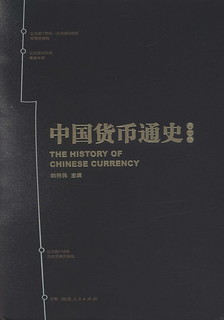 More surprisingly, Yao's bibliography in these volumes is outdated. Most of them are
the 1980s and 1990s publications. It is difficult to find a citation after the 2000s. In
volume 1, where he reviews the origin of ancient Greek currency, he referred to a
Chinese translation of A Theory of Economic History by Sir John Hicks (1904-1989) in
1987. In contrast, his book did not show recent outstanding research by Moses
Finley, Allain Bresson, and Peter Thonemann.
But from another point of view, it reflects that the study of monetary history after the millennium was stagnant in China.
At
least, they did not keep pace with international levels.
More surprisingly, Yao's bibliography in these volumes is outdated. Most of them are
the 1980s and 1990s publications. It is difficult to find a citation after the 2000s. In
volume 1, where he reviews the origin of ancient Greek currency, he referred to a
Chinese translation of A Theory of Economic History by Sir John Hicks (1904-1989) in
1987. In contrast, his book did not show recent outstanding research by Moses
Finley, Allain Bresson, and Peter Thonemann.
But from another point of view, it reflects that the study of monetary history after the millennium was stagnant in China.
At
least, they did not keep pace with international levels.
As for the context, the biggest weakness is the transition period from late-Qing coinage to the final monetary reformation in 1933. In volume 3, which covers this period, Yao discusses the modernization and industrialization of coinage in 95 pages, while the entire volume has 400 pages. The rest are paper bills of the Republic of China and foreign banks in China. Unlike other volumes, volume 3 has two authors: Yao himself and Dai Jianbing. Dai has specialties in paper money in modern China. Dai makes major contributions to this volume (though he does not refer and international research), but his name was placed after Yao.
Moreover, the pictures in these volumes are not up to standard. Regarding numismatic books, the most crucial factor is the quality of coinage pictures. A standard coin picture must be in scale, with detailed information (material, weight, diameter, thickness), and in colour if necessary because pictures are integral parts of the research. In Yao's books, a piece of eight Mexican silver dollar is as same as a nickel. Readers can hardly recognize the inscriptions of the peso.
Admittedly, Yao makes merit to the research in volume 1. He questions that Marxian economics in China was not Karl Marx's theory but a pseudo-concept distorted and manipulated by the Soviet Union. As a result, the methodology in Chinese monetary research is inappropriate. He reviews the origin of the Chinese currency and concludes that cowries and shells that have long been treated as nascent money in Xia/Shang dynasties are not actual money. So he criticizes previous scholars who intentionally misinterpreted the context in ancient documents, taking those supporting their theory and rejecting those not. He argues that these scholars violated dialectical materialism, overlooking business economics and the development of the entire society.
In sum, Yao's work does not even shed a new light on numismatic research on Chinese currency for overlooking up-to-date research from both home and overseas. At this time, Peng Xinwei's outstanding book can be seen as the most and only valuable research in Chinese monetary history.
For more information, or to order, see:
General History of Chinese Currency Volume I(Chinese Edition) Paperback – May 1, 2018
(https://www.amazon.com/General-History-Chinese-Currency/dp/7556118983)
General History of Chinese Currency Volume II(Chinese Edition) Paperback – May 1, 2018
(https://www.amazon.com/General-History-Chinese-Currency-II/dp/7556118991)
APP REVIEW: COINSNAP
Austin Purvis published a review of the CoinSnap app on CoinWeek. Here's an excerpt - see the complete article online for more. I'd seen the app promoted online but hadn't tried it. Has anyone else given it a shot? -Editor
The company Next Vision Limited is an AI technology group that developed the mobile app CoinSnap. CoinSnap is described on the app store as a tool that utilizes AI-driven image recognition technology to accurately identify any coin
and has a coin grading feature and gives a reference price for each coin.
At the time of writing, the app has over one million downloads on the Google Play store and is the #2 reference app on Apple.
How accurate is this tool? We were able to use the app for an afternoon, and here is what we found.
To test the app ourselves, we scanned 15 coins: 10 uncertified and five certified. Each coin was photographed in the same set-up, and each coin was scanned three times. This test could benefit from more coins to create a larger sample size, and we already have plans to test this app further. The uncertified group included the following coins: U.S. coins in circulation (a penny, a nickel, a dime, a quarter); a U.S. Presidential $1 coin; a South Korean won; an Australian silver dollar; an Eastern Caribbean 25-cent piece; and a commemorative United States half dollar.
Four of the certified coins were all graded MS and included a Buffalo nickel; a Morgan dollar; a Peace dollar; and a Mercury dime. The final coin was an ancient Roman T. Quinctius Flamininus silver denarius graded XF. In total, we tested three coins certified by PCGS and two graded by NGC.
CoinSnap was able to accurately identify 14 out of the 15 coins provided, coming to 93% accuracy. The coin it was unable to identify was the single ancient coin, graded by NGC. To explore this further, we took ancient coin images from our latest article from Mike Markowitz and submitted them. The app was not able to accurately identify any of these additional coins. The app provided a list of potential matches for these coins, spanning from other ancient coins that were incorrect to a Canadian one-cent piece.
Numismatics is a wide, wide world, but with so many images and information being published freely online, it provides a great training set for artificial intelligence systems. These programs should only get better over time, moving from modern coins to coins of earlier eras including ancients, and then tokens, medals, paper money and even ethnographic moneys. -Editor
To read the complete article, see:
Can an A.I. Collecting App Correctly Identify and Grade Coins?
(https://coinweek.com/coins/coin-collecting-strategies-2/tips-for-new-collectors/can-an-a-i-collecting-app-correctly-identify-and-grade-coins/)
NEW ORLEANS MINT RESTORATION ON NNP
The latest addition to the Newman Numismatic Portal is a brochure detailing the 1970s reconstruction of the New Orleans Mint building. Project Coordinator Len Augsburger provided the following report. -Editor
New Orleans Mint Restoration
An idle derelict
in 1975, the New Orleans Mint at 400 Esplanade Avenue was donated by the United States to the Louisiana State Museum in 1966. Reconstruction completed in 1979, and today the space serves the Louisiana State Museum with a variety of rotating exhibits, including a tribute to the numismatic history of the museum. Recently scanned from the Newman papers is a contemporary, well-illustrated eight-page brochure detailing the reconstruction.
The New Orleans Mint was designed in Greek Revival style by William Strickland, who was also the architect of the (second) Philadelphia Mint that opened in 1833. The New Orleans Mint struck its first coin in 1838 and its last in 1909, and the building served a variety of purposes prior to its reconstruction, including use as a prison.
Image: View of the New Orleans Mint courtyard
Link to Old Mint Restoration Now Complete
:
https://archive.org/details/EPN0322-1979oldmintrestorationn
THE BOOK BAZARRE
Bowers Serieswas written by award-winning author Joshua McMorrow-Hernandez, who presents these silver coins to both collectors and investors. 384 pages. Order your copy online at Whitman.com , or call 1-800-546-2995.
VIDEO: CHINA MINT LONG BEACH PANDA-MONIUM
The David Lisot Video Library on the Newman Numismatic Portal can be found at:
https://nnp.wustl.edu/library/multimediadetail/522852
We highlight one of his videos each week in The E-Sylum. Here's one from 1987 about the China Mint and their fast-selling commemorative made for the Long Beach show. Do these sell at any premium over melt value today? -Editor
David Lisot travels to the Long Beach Coin Expo with Sam Lopresto, Gus Argyrus, Martin Weiss, B.H. Lim, Mayor of Long Beach, Mr. Shin. About the 1987 Panda Silver 5 ounce Long Beach Expo issues that has lines of people wanting it.
 Sam Lopresto discussed the huge public interest in the show generated by David's suggestion of a promotional commercial on local television.
Sam Lopresto discussed the huge public interest in the show generated by David's suggestion of a promotional commercial on local television.
The China Mint issued a commemorative medal for the show with a total mintage of 2,000. 1,000 were brought to the show with 500 made available to dealers and the remaining 500 to the public on a first-come-first-served basis. A huge line snaked all around the floor. -Editor
To watch the complete video, see:
https://nnp.wustl.edu/library/book/584267
AMERICAN MEDALLIC ART BOOK SERIES PLANNED
Alexander Krapf, the creator and maintainer of the Medallic Art Collector website, has been working hard on the first eBook in what he hopes will be a long series about 20th Century American Medallic Art. -Editor
"The first volume will be titled The Medallic Art of Laura Gardin Fraser
and it is slated to come out this year. Next up in the series are her husband, James Earle Fraser, Rene Paul Chambellan, and Paul Manship. I will happily accept material about any 20th Century artist as I hope to work my way through all of them over the years. I am asking for the help of collectors in sourcing images of the artists' rarer medals, bas-relief plaques, as well as any research, variant data, photos, etc. that specialist collectors might be able to contribute. You can reach me at
pianola_duet_0a@icloud.com. I will give full credit in the books. Contributors of content that ends up in the book will also receive a free copy of the eBook."
I'm sure a number of readers may be able to help with this project. There are two versions of the Medallic Art Collector website, with new collaboration features in the beta test version. -Editor
To visit the websites, see:
https://www.medallicartcollector.com/
http://beta.medallicartcollector.com/
2022 ANA CLUB PUBLICATIONS COMPETITION
The ANA is accepting submissions for the 2022 Barbara J. Gregory Outstanding Club Publications competition. Here's the announcement. There are many great club publications being produced these days - good luck to all! -Editor
Submissions Accepted for ANA's Club Publications Competition
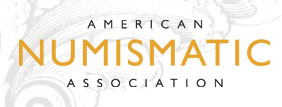 The American Numismatic Association (ANA) is currently accepting submissions for the 2023 Barbara J. Gregory Outstanding Club Publications competition. Awards will be presented in four categories: local, regional, specialty and electronic. The contest is open to member clubs that are current with their ANA dues, and do not have an elected or salaried ANA officer as editor or assistant editor. Each publication may enter in only one category. If a publication qualifies for more than one category, such as local and electronic, the submitter may choose under which category to enter.
The American Numismatic Association (ANA) is currently accepting submissions for the 2023 Barbara J. Gregory Outstanding Club Publications competition. Awards will be presented in four categories: local, regional, specialty and electronic. The contest is open to member clubs that are current with their ANA dues, and do not have an elected or salaried ANA officer as editor or assistant editor. Each publication may enter in only one category. If a publication qualifies for more than one category, such as local and electronic, the submitter may choose under which category to enter.
Submissions for all categories must include just three samples of publications from 2022 and can be either mailed or emailed. Also required are the category of submission (local, regional, specialty or electronic); the editor's name; and the name, address, phone number and email address of the submitter. Completed submissions must be postmarked or emailed no later than April 1.
Judging Criteria
Publications are rated on a scale of 1 to 5 (1-poor, 5-excellent) in the following areas: General appearance/appeal; consistency of format; neatness/readability; presentation of club-related news; presentation of numismatic/scholarly information; aptness/quality of illustrations; and originality/creativity. The size of the club and the amount of funds expended is not a factor in judging.
Completed electronic entries can be emailed to Olivia McCommons at omccommons@money.org. All others should be sent to:
Outstanding Club Publications Competition
ANA Publications Department
c/o Olivia McCommons
818 N. Cascade Avenue
Colorado Springs, CO 80903
Honors will be presented at the ANA World's Fair of Money® in Pittsburgh.
To view the submission guide online and to see past winners, visit money.org/outstanding-club-publications. For more information, contact omccommons@money.org.
2023 COLLIER PRIZE APPLICATIONS ACCEPTED
The American Numismatic Society (ANS) is accepting applications for the 2023 Collier Prize in Ancient Numismatics. -Editor
The American Numismatic Society Invites Applications for the 2023 Collier Prize in Ancient Numismatics
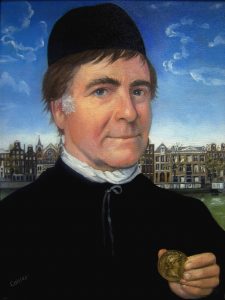 The American Numismatic Society is pleased to invite applications for the 2023 Collier Prize in Ancient Numismatics, to be awarded to the best single or multi-authored book, catalog, or online digital work related to ancient numismatics (650 BCE to 300 CE).
The American Numismatic Society is pleased to invite applications for the 2023 Collier Prize in Ancient Numismatics, to be awarded to the best single or multi-authored book, catalog, or online digital work related to ancient numismatics (650 BCE to 300 CE).
This distinguished prize seeks to reward innovative research in the field and is one of the most substantial monetary prizes to support scholarship in ancient numismatics. The winner(s) of the biennial prize will receive $20,000, to be split equally in the event of a multi-authored work. The prize was previously awarded to Richard Abdy's Roman Imperial Coinage (RIC) Vol.II: From AD 117 to AD 138 – Hadrian (Spink, 2020).
The Collier Prize was established in 2020 with the generous support of ANS Trustee Carole Anne Menzi Collier to honor the life of her late husband Professor James M. Collier. Professor Collier earned his Ph.D. in Art History at the University of Michigan with his dissertation on the Italian Renaissance and Early Netherlandish perspective, and served as a tenured professor and department chair in the Department of Art at Auburn University. Ancient coins served as a foundation for his fascination with art, history, and culture, and Professor Collier was inspired by his collection of almost 1,000 Greek and Roman coins depicting famous monuments and portraits of Hellenistic and Roman rulers.
The application for the Collier Prize is now live on the ANS website. The deadline for submissions is June 30, 2023. Eligible publications are limited to works published in 2021 or 2022. A jury of five senior numismatists appointed by the President of the American Numismatic Society, including a senior ANS curator, will review submissions and elect the winner(s), to be announced in 2024. The winner(s) will be invited to an award ceremony held in person at the ANS headquarters in New York City.
To read the complete article, see:
The ANS Invites Applications for the 2023 Collier Prize in Ancient Numismatics
(https://numismatics.org/2023-collierprize-pressrelease/)
For more information, or to apply, see:
The Collier Prize in Ancient Numismatics
(https://numismatics.org/collierprizewinners/)
To read the earlier E-Sylum articles, see:
ANS COLLIER PRIZE IN ANCIENT NUMISMATICS
(https://www.coinbooks.org/v23/esylum_v23n49a06.html)
COLLIER PRIZE: ABDY'S ROMAN IMPERIAL COINAGE
(https://www.coinbooks.org/v24/esylum_v24n46a06.html)
IAPN STATEMENT ON FALSE PROVENANCES
The IAPN has issued a statement regarding false provenances and the criminal complaints regarding dealers Richard Beale and Italo Vecchi. -Editor
Statement of the International Association of Professional Numismatists Regarding Criminal Complaint Brought by the Manhattan District Attorney Against Richard Beale, the Proprietor of Roma Numismatics
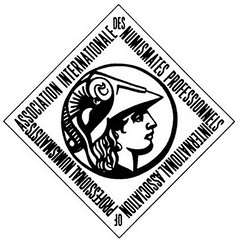 The International Association of Professional Numismatists (IAPN) has become aware that the
New York District Attorney's Office has brought a criminal complaint against Richard Beale, the managing
director of Roma Numismatics Limited, a London-based auction house. That criminal complaint alleges
that Beale unlawfully purchased valuable coins from Italy, Greece, and Gaza in violation of local national
patrimony laws and created false provenances to hide their illicit origins. The criminal complaint also
alleges that Italo Vecchi, an Italian dealer based in London, aided this effort for a Roman Republican gold
coin of Brutus and another silver coin from Naxos, an ancient Greek colony in Sicily.
The International Association of Professional Numismatists (IAPN) has become aware that the
New York District Attorney's Office has brought a criminal complaint against Richard Beale, the managing
director of Roma Numismatics Limited, a London-based auction house. That criminal complaint alleges
that Beale unlawfully purchased valuable coins from Italy, Greece, and Gaza in violation of local national
patrimony laws and created false provenances to hide their illicit origins. The criminal complaint also
alleges that Italo Vecchi, an Italian dealer based in London, aided this effort for a Roman Republican gold
coin of Brutus and another silver coin from Naxos, an ancient Greek colony in Sicily.
IAPN regular members are firms, not individuals. Individuals might become corresponding members and, of course, honorary members because of special distinguished services rendered to the Association. Roma Numismatics has never been an IAPN member firm. Italo Vecchi, who had worked for several members of the IAPN, was made a corresponding member when he retired from day-to-day business and was later made honorary member for his long service within the IAPN in 2007.
Given the New York District Attorney's allegations, on March 3rd, 2023, the IAPN Executive Committee decided to suspend Mr. Vecchi pending resolution of these charges. If proved to be true, these allegations would constitute a clear and very serious violation of the rules of the Association. Nevertheless, IAPN notes that both Messrs. Beale and Vecchi remain entitled to a presumption of innocence until such time that the New York District Attorney substantiates these charges in a Court of Law.
The IAPN is a nonprofit organization of the leading international numismatic firms
founded in 1951. It was formed in the aftermath of WW II to help reestablish relationships
amongst professional numismatists that had been badly frayed during years of conflict. The
objectives of IAPN are the development of a healthy and prosperous numismatic trade
conducted according to the highest standards of business ethics and commercial practice, the
encouragement of scientific research and the propagation of numismatics, and the creation of
lasting and friendly relations amongst professional numismatists around the world. IAPN
members promise [to] guarantee that good title accompanies all items sold, and never
knowingly to deal in any item stolen from a public or private collection or reasonably suspected
to be the direct product of an illicit excavation, and to conduct business in accordance with the
laws of the countries in which they do business.
They further promise [T]o describe
numismatic items accurately, and to refrain from any misrepresentation of origin, date,
condition, provenance, pedigree, or value.
The IAPN has over one hundred member-firms around the world in twenty countries, including twenty-seven in the US. More about the IAPN may be found on the internet at http://www.iapn-coins.org.
IAPN's complete ethics rules can be found here: https://iapn-coins.org/iapn/association/.
IAPN President Mr. Daniel F. Sedwick adds:
"The IAPN unequivocally stands against misrepresentation of provenance, and we stress it is not a normal occurrence in the coin industry. A system like the UK's Treasure Act would go further to deter theft of cultural property by requiring the country of origin to pay a fair market price for any found item it deems important."
Kavan Ratnatunga writes:
"I remember watching this auction, and submitting a screen capture of the winning bid"
To read the earlier E-Sylum article, see:
GOLD IDES OF MARCH COIN REALISES $4M
(https://www.coinbooks.org/v23/esylum_v23n44a22.html)
RICHARD BEALE OF ROMA NUMISMATICS ARRESTED
(https://www.coinbooks.org/v26/esylum_v26n11a16.html)
MORE ON OVERPRINTED MINT BAGS
Ken Berger writes:
"Regarding the overprinted mint bag shown in The E-Sylum, it looks more like a 1948 to me rather than a 1918."
Readers agree! -Editor
B.J. Herbison writes:
"Let's apply the same tools we use for overdate coins to the overdate mint bag.
"The overdate appears to me to be 1950 over 1948. I think I see the cross-bar of the "4", and the serif of the "1" or "4" doesn't match the slant of the 1s at the start of the two date -- it is steeper and longer.
"Also, 1948 would be more likely. Thirty year old bags would be more likely to be disposed of.
"There is also a font change between the dates. The serifs are wider and the 9 is thicker. Does the 1950 font match the font of other 1950 bags or is it only used for overdates?"
Pete Smith writes:
"I am happy to see continued interest in U. S. Mint coin bags. A 1950 overdate of a 1918 bag would be intriguing, but that is not what was shown this week. It is clear to me that the underdate in 1948.
"I have not seen a 1918 Nickel bag, but it would be a different type. The early bags held a thousand nickels with a value of $50. These $50 bags were used as late as 1943 and probably through the end of the warnicks.
"Overprinted dates on U. S. Mint coin bags are quite common. Bags were sent to the Federal Reserve and returned for reuse in a closed loop. Used bags were redated. I have seen as many as three cancelled dates on the same bag,
"I have also seen a bag originally issued in Philadelphia and renamed for Denver. I have seen a couple of bags with the original text cancelled on one side and the other side issued for a different denomination and date.
"My attempt to catalog Mint bags has made good progress in the past month. I currently have photos of 86 different types and have recorded 178 date varieties. I would love to hear from E- Sylum readers who have any bags from the 1930's or earlier."
To read the earlier E-Sylum article, see:
NOTES FROM E-SYLUM READERS: MARCH 12, 2023 : Overdated U.S. Mint Bags
(https://www.coinbooks.org/v26/esylum_v26n11a14.html)
MORE ON PROFESSOR JACKSON
Julia Casey writes:
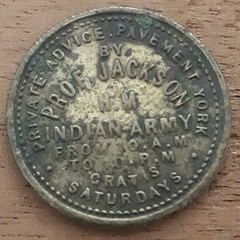 "Regarding David Pickup's question about "Prof. Jackson." I don't know if I located the correct individual, but I feel he is a distinct possibility.
"Regarding David Pickup's question about "Prof. Jackson." I don't know if I located the correct individual, but I feel he is a distinct possibility.
"I focused my search on Yorkshire in the mid-19th century and found newspaper articles from 1872-3 in Hull mentioning the arrest of a "Quack Doctor" who is described as "Professor Jackson and his Indian Remedy." Professor Jackson was identified as "Henry Jackson, 35, well known in York" an "imperfectly educated" "herbalist," "formerly a drum-major of the Hull Rifle Volunteers" and "late of the Indian army R.C.A.R." These "mysterious initials were rendered in court into 'Railway crossing Albany-road,' near where the prisoner lived." Most of Professor Jackson's medicines were found to be composed "only of coloured water."
"Here is an advertisement for Professor Jackson in Hull from before his arrest (Hull Daily News 7/27/1872)."
David Powell writes:
"Not sure whether the following excerpts refer to the same Professor Jackson that the token does, but the man described seems to be the same sort of enigmatic individual, offering dubious services, as the issuer. He doesn't have any links with the Pavement in York, but he does with the one in Nottingham. Such characters would often travel around the country, especially if there was any danger of the quality of their product being exposed. They lived by their wits, using whatever skills they had, and turn their hand to anything.
"The Victorian era saw a fashion for quackery and pseudo-science which certain people, of debateable qualifications and origin, were very happy to try and professionally exploit. There were a number of token issuers amongst them.
"The Era, the main journal of the theatre and music hall at the time, also contains several late-1870s references to a Professor Jackson performing as a ventriloquist. Whether he is the same man I don't know, but you certainly wouldn't need an academic qualification to do that job."
From the Alloa Circular, Wednesday 22 February 1882:
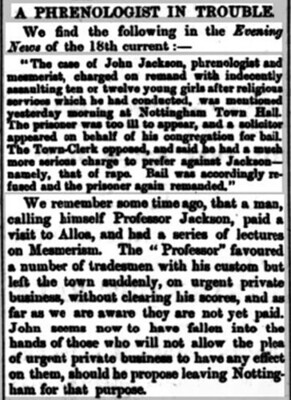
A PHRENOLOGIST IN TROUBLE. We find the following in the Evening News of the 18th current :- "The case of John Jackson, phrenologist and mesmerist, charged on remand with indecently assaulting ten or twelve young girls after religious services which he had conducted, was mentioned yesterday morning at Nottingham Town Hall. The prisoner was too ill to appear, and a solicitor appeared on behalf of his congregation for bail. The Town-Clerk opposed, and said he had a much more serious charge to prefer against Jackson, namely, that of rape. Bail was accordingly refused and the prisoner again remanded.
We remember some time ago, that a man, calling himself Professor Jackson, paid a visit to Alloa, and had a series of lectures on Mesmerism. The "Professor" favoured a number of tradesmen with his custom but left the town suddenly, on urgent private business, without clearing his scores, and as far we are aware they are not yet paid. John seems now to have fallen into the hands of those who will not allow the plea of urgent private business to have any effect on them, should he propose leaving Nottingham for that purpose.
Thanks, everyone. We can imagine what the "private examinations" entailed. -Editor
Julia adds:
"I think my guy is more likely...but the dates are just enough off to make me wonder if they were the same person."
To read the earlier E-Sylum article, see:
NOTES FROM E-SYLUM READERS: MARCH 12, 2023 : Query: Prof. Jackson's Free Advice
(https://www.coinbooks.org/v26/esylum_v26n11a14.html)
NOTES FROM E-SYLUM READERS: MARCH 19, 2023
1920 Royal Canadian Mint Video
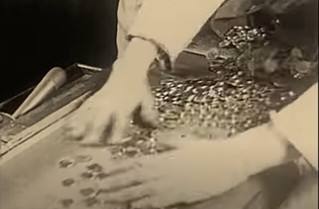 Regarding the mystery minting film discussed last week,
B.J. Herbison writes:
Regarding the mystery minting film discussed last week,
B.J. Herbison writes:
"I contacted someone related to the University of Rare Coins which produced the video. URC is closed, but I confirmed the video was from the Royal Canadian Mint back in 1920."
Thank you! B.J. got a link to the original video as well. It's a processed version of a public domain film from the Library of Congress Prelinger Archives. Check it out! -Editor
To watch the video, see:
How Money Is Made 1920 Royal Canadian Mint (Royal Mint of Canada); Coinage at the Ottawa Mint
(https://vimeo.com/376390922)
To read the earlier E-Sylum article, see:
NOTES FROM E-SYLUM READERS: MARCH 12, 2023 : Vintage 1920's Minting Film
(https://www.coinbooks.org/v26/esylum_v26n11a14.html)
1933 Mississippi Spanish Gold Find
Jim Haas writes:
"I am a sucker for articles about people discovering things, especially when I'm not looking for them.
"This article was published in a large number of newspapers in 1934. It aroused my curiosity, so I tried finding additional information in its regard. Regrettably, I came up empty, but did find one of the men mentioned in it, Forest Lee, not Lea but no references were made regarding discovering gold."
Thank you - great story. I haven't checked to see if this find was mentioned in the Bowers or Kleeberg books on coin hoards. -Editor
If Cornelius Vermeule Were a Restaurant Critic
Dennis Tucker writes:
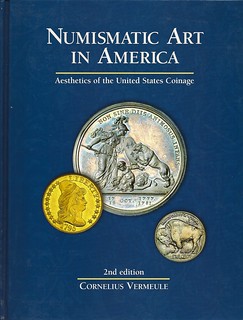 "I would be remiss if I didn't submit this to The E-Sylum. I wrote it in the summer of 2007, shortly after the second edition of Numismatic Art in America debuted. A bunch of us from Whitman Publishing went out to lunch at Fat Matt's Rib Shack (an actual place here in Atlanta, the inspiration for "Fat Jack's"), and I couldn't resist reviewing the experience in the voice of the unique Dr. Cornelius Vermeule.
"I would be remiss if I didn't submit this to The E-Sylum. I wrote it in the summer of 2007, shortly after the second edition of Numismatic Art in America debuted. A bunch of us from Whitman Publishing went out to lunch at Fat Matt's Rib Shack (an actual place here in Atlanta, the inspiration for "Fat Jack's"), and I couldn't resist reviewing the experience in the voice of the unique Dr. Cornelius Vermeule.
"My last correspondence with Dr. Vermeule was in August 2008, when I informed him Numismatic Art in America won "Extraordinary Merit" from the Numismatic Literary Guild at the ANA convention in Baltimore. David T. Alexander accepted the award on his behalf at the NLG banquet. This may have been his last literary award; he passed away four months later. I remember the playful postcards and letters that embodied his wit and creativity."
Here's Dennis' delightful piece. -Editor
To read the earlier E-Sylum articles, see:
CORNELIUS CLARKSON VERMEULE III (1925-2008)
(https://www.coinbooks.org/v26/esylum_v26n10a13.html)
MORE ON CORNELIUS VERMEULE
(https://www.coinbooks.org/v26/esylum_v26n11a12.html)
Giesecke & Devrient CEO Seigfried Otto
"My wife and I had dinner with Herr Otto at his home in June 1984.
"He regaled us with the story of how he escaped from the Russian internment camp in Poland at the end of WWII.
"Herr Otto feigned a problem with his eyes after he put drops of some yellow substance in his eyes, gradually giving a yellow hue to his eyes. The camp doctors accepted his plea to be transferred to a major Polish city for further examination and possible treatment. Once out of the camp Siegfried Otto, he managed his escape. He wily evaded check points and eventually got to Leipzig, W Germany, the then HQ of Geisecke und Devrient. As a former G&D manager, he sought out G&D. He resurrected the printing of W German banknotes. His eventual HQ in Munich was down the street from the hotel US Gen McCoy used as his HQ. (As an aid to his promotion he was married to the daughter of co-founder Deverient, either prior to or after WWII.)
"As I understand, due to G&D's success in printing German banknotes, that G&D was awarded a 50% contract to print German banknotes. I have a feeling that the contract still exists.
"In retrospect, the company which Herren Geisecke and Devrient founded, and subsequently under the guidance of Herr Otto, is respected worldwide and is a leader in both banknote printing and banknote related machinery."
Thank you. Amazing story. -Editor
For more information on Giesecke & Devrient (now G+D), see:
https://www.gi-de.com/en/
West Chester Centennial Medal
Jim Haas writes:
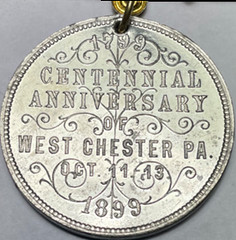 "West Chester is a borough and the county seat of Chester County, Pennsylvania located within the Philadelphia Metropolitan area. This medal was cast for a three-day centennial celebration, October 11-13, 1899. West Chester: Past and Present was published by the Daily Local News, a local area newspaper, as a Centennial Souvenir, 1799-1899. Virtue, Liberty and Independence is the Pennsylvania State Motto officially adopted in 1875. While the medal is not mentioned in the program book, interested readers can access a copy via Google Books."
"West Chester is a borough and the county seat of Chester County, Pennsylvania located within the Philadelphia Metropolitan area. This medal was cast for a three-day centennial celebration, October 11-13, 1899. West Chester: Past and Present was published by the Daily Local News, a local area newspaper, as a Centennial Souvenir, 1799-1899. Virtue, Liberty and Independence is the Pennsylvania State Motto officially adopted in 1875. While the medal is not mentioned in the program book, interested readers can access a copy via Google Books."
Nice piece. Thanks. -Editor
To read the publication on Google Books, see:
West Chester, Past and Present
(https://www.google.com/books/edition/West_Chester_Past_and_Present/KXftxAEACAAJ)
PCGS REDEFINES CONFEDERATION-ERA COPPER COINS
PCGS has decided to label a series of early American Colonial coins on its slabs as "halfpennies." -Editor
Professional Coin Grading Service (www.PCGS.com) is officially redefining a series of early American Colonial coins widely categorized by their state names and copper composition with numismatically correct references to their original denominations. The move recategorizes confederation-period New Jersey, Vermont, and Connecticut coins as well as other pieces, such as Immune Columbia and Nova Constellatios, colloquially dubbed coppers
by their correct halfpenny
denominations.
We periodically make these changes based on strong document-based evidence and extensive research consulting original mint records, historic legislative documents, and other archival references that are thoroughly vetted,
explained PCGS President Stephanie Sabin. In the case of redefining New Jersey, Vermont, Connecticut, and other confederation-era ‘coppers' as halfpennies, the PCGS numismatic and grading teams as well as many trusted consultants and external experts spent many hours researching legal government documents and numismatic references contemporary to the confederation era to determine that the technical definition of these coins is of the era to determine that they are correctly known as halfpennies and not merely ‘coppers.'
Researchers acknowledge it is clearly evident in state assembly documents of the period from New Jersey, Vermont, and Connecticut that the confederation-era copper coinage was designed as weight- and standard-based equivalents to the British halfpenny coinage, then nicknamed coppers.
However, copper
was [not an] official denomination of any coin used during the colonial period or federal eras.
Sabin cited that, in a similar vein, the current widespread use of the slang term penny
to refer to the United States one-cent coin or nickel
for the nation's five-cent coin are also technically incorrect. We often make minor changes to definitions on labels to improve the clarity of our specifications and overhaul other overly abbreviated, incorrect, or imprecise referential formats to ensure that our nomenclature is as numismatically sound as possible.
A team of PCGS and industry experts has presented their many findings in a detailed article on PCGS.com that explains not just the reasoning behind this nomenclature change but also the myriad historical facts supporting it.
To read the complete article, see:
PCGS Defines Confederation-Era American Copper Coins by Correct Denominations
(https://www.pcgs.com/news/pcgs-defines-confederation-era-american-copper-coins-by-correct-denominations-)
Here's an excerpt from the research article by Craig Sholley, John Dannreuther, Jeff Rock, William Eckberg, Chris McCawley, and Brian Greer. -Editor
Many of the Confederation-period copper coins, including the Connecticut, New Jersey, and Vermont state coinages, along with private issues such as the Nova Constellatio, Immune Columbia, and 1785 USA Bar
piece, are presently referred to as coppers.
However, that has not always been the case. Historical records show that the term coppers
started out as colonial-period jargon for the British half penny and quickly became the common term for any copper coin about the same size and weight, just as nickel
is common slang for all federal copper-nickel five-cent pieces today. However, times change and so do the meaning of words. By the 1830s, the millions upon millions of federally struck half cents and cents had overwhelmed the old coppers,
and the term came to generally mean any copper coin – particularly the federal cents.
By the 1850s, the volume of federal cents in circulation resulted in the Connecticut, New Jersey, and New York coppers
often being called cents in numismatic literature. They were roughly the same size as the Massachusetts Cent and Fugio Cent, which were struck during the same time period; so, use of the term, although incorrect, is certainly understandable.
Common names are often used for coins. Current auction catalogs use nickel
when referencing the five-cent piece, so it would certainly seem acceptable to call these coins coppers.
However, the use of copper
or coppers
does present some significant issues. Unlike nickel,
almost no one today understands how the term coppers
came about and that it formerly meant halfpence. Ask someone today what the denomination of a Connecticut copper
is, and the result will generally be a blank stare or a vague response like, They've always been called coppers.
The history has been forgotten.
The lack of a recognized denomination has also caused a good deal of confusion in referring to these pieces. There is no denomination shown in major reference books, such as A Guide Book of United States Coins (widely known as The Red Book
).
With that in mind, this article presents evidence that the intended denomination of these coppers
was a half penny in the hope that the numismatic community will end this unfortunate confusion and start to reference these coins by their correct denomination.
We urge the numismatic community to restore the correct denomination of half penny, using 1/2P
to distinguish an American half penny
from the British denomination (1/2D
). 1/2P
is the proper denomination as the state coinages were struck under authority of the Articles of Confederation, thus making those coins United States issues. Applying the same term to privately struck issues, including those imported from abroad, is also appropriate as the coins were intended to pass in the U.S. as halfpence.
Since these pieces (and other period coinage) are most certainly NOT colonial coins, we further urge the community to consider moving references to these coins under a category such as Confederation-Period Coinage
or Post-Colonial Coinage,
the latter term already being used by The Red Book
and other numismatic organizations.
It would be proper for the auction companies to likewise use the proper denomination, but not absolutely necessary as the slang term nickel
is typically used for five-cent coins. However, we do feel that if they continue with copper,
they should at least explain that the proper denomination is a half penny.
To read the complete article, see:
Confederation-Period Copper Coins: Halfpence, Cents, or Coppers?
(https://www.pcgs.com/news/confederation-period-copper-coins)
We'll be hearing more about this topic in the near future. As I was about to publish tonight, this submission arrived. -Editor
Recently, an article appeared that asserts that state coppers of the confederation era
should be denominated as halfpence. This is a controversial article and one of the authors has
already disavowed the work and requested his name be removed, while another of the listed
authors was unaware his name was to be appended to the piece and struggles to defend its
conclusions. A group of colonial numismatic scholars will prepare a formal repudiation of this
conclusion for the June issue of the Journal of Early American Numismatics. The consensus of
these colonial coin experts, who have studied these coins for decades and written books and
articles on them, is that they are officially and customarily termed coppers,
and should not be
designated halfpence.
These coins arose during the period between the end of the Revolutionary War and the adoption of our current federal constitution when some states minted copper coins for the use and convenience of their citizens and merchants as small change. They were issued, not as replacements for British halfpence, but to give authority and control to the new states in opposition to the British halfpence. To give all these pieces the same arbitrary value is misleading. A Connecticut copper did not have the same value in commerce as a New Jersey copper; if it did, New Jersey coppers would not sometimes be found overstruck on Connecticuts. The overstriking of these pieces and others, clearly demonstrates that they had different, and variable, values in commerce. In 1787, the New Haven Mint, which had federal and state contracts to mint copper coins, took the federal copper provided by the U.S. Government to mint Fugios and used it to strike Connecticut coppers because they traded at a higher value than Fugios per their copper content.
Most state coppers were a commodity that acted like tokens; from one day to the next,
they might have a different accepted value in commerce. In large transactions, they were sold in
kegs by weight. These coppers did not have a denomination on them, and many of the issues
(New Jersey coppers excepted) were not legal tender; and could not be used in the payment of
taxes or legal obligations. Only a fool in 1788 would trade a gold coin for coppers. The
designation of coppers
for these pieces is proper to show that they are the patchwork of a
newly formed America, and they are deserving of a unique designation distinguishing them from
their British halfpence counterparts. The article's authors, who did not present their work for a
scholarly peer review, have written an article with a solution in search of a problem that creates
confusion among novice collectors and the public.
Christopher R. McDowell,
President, Colonial Coin Collectors Club (C4),
Editor, Journal of Early American Numismatics,
Author, Abel Buell and the Connecticut Mint.
UPDATE ON THE MORRIS 1792 SILVER CENTER CENT
On Tuesday Rob Rodriguez passed along this update on continuing research into the Morris 1792 Silver Center Cent. Thank you. -Editor
This morning the Newman Numismatic Portal published my latest analysis of the 1792 Morris Silver Center Cent:
Follow-Up 1792 Silver and Non-Silver Center Cents: Further Studies of the Silver Plug Contained in the Morris So-Called Silver Center Cent
https://nnp.wustl.edu/library/book/624495.
On March 21 the 1792 Morris Silver Center Cent Judd-1 will be put up for auction in Stack's Bowers Galleries Session 3 Rarities Night, Lot 3063. In my opinion, Stack's Bowers lot description presents a balanced viewpoint by referencing my April 2020 NNP Symposium presentation and its primary conclusion that this is a genuine Judd-2 which was altered by the addition of a silver plug, after the coin was struck, to convert it into a Judd-1.
Tony Lopez and I visited Stack's Bowers on March 1. As a result of this visit, we were able to confirm additional insights. This Follow-Up commentary reaffirms the opinion held by the research team, composed of Tony Lopez, Stuart Levine, Maureen Levine and me. Twenty-one new exhibits show how the Morris Specimen is entirely different from all other genuine Judd-1s. New images provide better insight of how Judd-1s were likely fabricated. Genuine Judd-1s were struck while the Morris plug has been hand-tooled after the coin was struck.
Having viewed the Morris Specimen again, it is clearly a genuine and beautiful 1792 pattern cent. Regrettably, it has been altered, as first opined in the 1905 Chapman catalog, to represent something it is not. It is now up to those who have certified and continue to support the Morris Specimen as a genuine Judd-1 to present their data as opposed to unsubstantiated and non-scientific opinion. For the prospective buyers, they will need to decide whether this coin is a genuine Judd-1 or an altered 1792 pattern cent.
Robert Rodriguez
To read the complete analysis on NNP, see:
1792 Silver and Non-Silver Center Cents: Further Studies of the Silver Plug Contained in the Morris So-Called Silver Cent
(https://nnp.wustl.edu/library/book/624495)
To read the earlier E-Sylum article, see:
NUMISMATIC NUGGETS: MARCH 12, 2023 : The Morris 1792 Silver Center Cent
(https://www.coinbooks.org/v26/esylum_v26n11a24.html)
VOCABULARY TERM: MODEL
Here's another entry from Dick Johnson's Encyclopedia of Coin and Medal Terminology. -Editor
Model. The product of the artist after he completes creating the relief. The model can be exact size, or oversize for pantographic reduction. Models for coins and medals have been made in a variety of materials – wax, clay, plasteline, plaster, wood, plastic, metal, stone, marble. Most often the artist works in a soft pliable material, such as clay, then prepares a hard cast of his model in plaster, or in very recent times, in epoxy. This cast can then be used by mints or medalmakers to prepare the dies by mechanical means.
When dies were cut by hand, only rarely did an artist prepare a three-dimensional model, which the hand engraver would copy by cutting the three-dimensional design into the steel die. Carving of wood models for coins and medals was done in Germany in the 16th century (called stechstein), or even models made of carved stone (solnhofer) were created for this purpose. This added a step between original design and the completed hand-engraved die, but allowed for two artists, perhaps highly specialized or talented in each technique, to create an exceptional die for striking. Some of these models from previous centuries still exist and are highly prized by collectors and museums.
To read the complete entry on the Newman Numismatic Portal, see:
Model
(https://nnp.wustl.edu/library/dictionarydetail/516344)
HELEN MANCHESTER GATES (1868-1950)
Archer M. Huntington was a major benefactor of the American Numismatic Society in New York, and served as its President from 1905 to 1910. E-Sylum Feature Writer and American Numismatic Biographies author Pete Smith submitted another background article illustrating Huntington's family and wealth. Interesting - thanks. -Editor
Our story last week was about Arabella Huntington, mother of Archer Milton Huntington. This week we jump forward one generation to Helen Manchester Gates, the first wife of Huntington. Before we get to her, we go back a generation to William Huntington (1782-1860).
William Huntington was born on April 12, 1782, in Harwinton, Connecticut. He was married to Elisabeth Vincent (1791-1871). William was a farmer and ran a shingle mill. William and Elizabeth had nine children including Collis Potter Huntington (1821-1900) and Ellen Marie Huntington Gates (1836-1920). The family was poor, living in a place called Poverty Hollow, and in 1834 county authorities removed Collis from the family and placed him with another farm family. As mentioned last week, Collis was the adoptive father of Archer Milton Huntington.
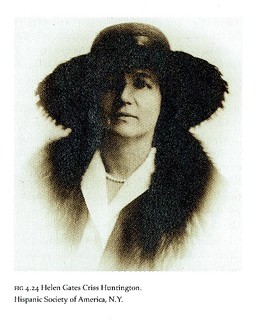 Ellen Marie Huntington married Reverend Isaac Edwin Gates. She was a successful and prolific
writer. They were parents of Helen Manchester Gates (1868-1950). Helen was born in Beaver
Dam, Wisconsin, on September 3, 1868. She married Thomas Ball Criss (1860-1913) on
December 4, 1889. He was the chief accountant for Collis Huntington. They had a daughter
Mildred (1890-1972) on October 6, 1890, and were divorced in 1895. Mildred was a third-
generation author and wrote books for children.
Ellen Marie Huntington married Reverend Isaac Edwin Gates. She was a successful and prolific
writer. They were parents of Helen Manchester Gates (1868-1950). Helen was born in Beaver
Dam, Wisconsin, on September 3, 1868. She married Thomas Ball Criss (1860-1913) on
December 4, 1889. He was the chief accountant for Collis Huntington. They had a daughter
Mildred (1890-1972) on October 6, 1890, and were divorced in 1895. Mildred was a third-
generation author and wrote books for children.
When Helen married Archer on August 6, 1895, at St. George's Church in London, it was the marriage of cousins. The church register identified the 27-year-old divorced mother as a spinster and daughter of Isaac Criss. Perhaps, like Arabella Huntington, she was attempting to conceal the facts of her first marriage.
Archer and Helen travelled frequently, often with Arabella, and split their time living in London and New York. In 1914, Archer and Helen travelled to Germany on behalf of the National Geographic Society. Discovered with a bunch of maps, they were suspected of being Russian spies and were arrested in Nuremberg. With pressure from the American State Department, they were released after three days.
Our story line now shifts to English actor Harley Granville Barker (1877-1946). He began an acting career on the stage at age 14 and became a favorite of writer George Bernard Shaw. By 1911 he gave up acting and continued as a playwright and director.
Lillah McCarthy (1875-1960) was noted as the loveliest leading lady of the English theater. Granville hired her to be the leading lady for his theater company. It was not long before she became the leading lady of his marriage on April 24, 1906.
Archer invited Granville to be director of the New Theatre in New York. Granville and Lillah
met Archer and Helen in New York and they became friends. Lillah was stricken with bronchitis
and confined to bed at the Ritz-Carleton Hotel. A concerned Helen visited at her bedside and
asked if there was anything she could do. It was reported that she whispered, Poor Granville
will be so lonely. Men are so helpless. Like babies, you've noticed? No resourcefulness. Won't
you make the days pass pleasantly for him until I am well?
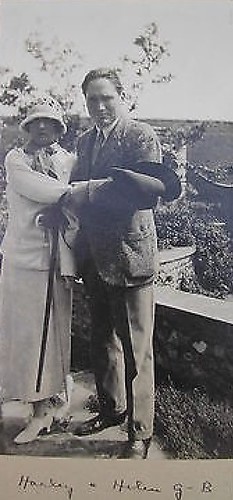 A kind friend, Helen invited Granville to her house for tea. By the time Lillah's health was
restored, her marriage was in serious trouble. Lillah wrote a letter to Archer who confronted
Helen with the accusation of an affair. Both couples began lengthy divorce proceedings.
A kind friend, Helen invited Granville to her house for tea. By the time Lillah's health was
restored, her marriage was in serious trouble. Lillah wrote a letter to Archer who confronted
Helen with the accusation of an affair. Both couples began lengthy divorce proceedings.
Archer Huntington was rich and Granville Barker was famous. The divorces may have caused whispered conversations among the social elite. They were not broadcast on national television, blogged about on the internet and analyzed endlessly on social media.
After their divorces, Granville married Helen Gates Huntington on August 31, 1918, at King's Weight House Church in London. At the time, he was 41 and she was 49. He began to hyphenate his name as Granville-Barker.
Helen was an author, wrote several plays and assisted Granville-Barker in translating plays from Spanish to Engish. Critics in London blamed Helen for stealing Granville-Barker away from the theater. She preferred to live in Paris away from London gossip.
When they sailed from England in 1920, they both gave their age as 42. In 1940, she gave her age as 61. Like Arabella, she could be vague about her age.
Granville-Barker died of a heart attack in Paris on August 31, 1946. Helen Manchester Gates Criss Huntington Barker died in Paris on February 16, 1950. Her estate was valued in London at £128,120.
Helen and Granville-Barker are buried at Cimetiere du Pere Lachaise, the largest cemetery in
Paris. On her tombstone is the name Helen Huntington Gates.
This was never her name.
People of my generation may recall when Elizabeth Tylor broke up the marriage of Eddie Fisher and Debbie Reynolds. A younger generation may recall Angelina Jolie, Brad Pitt and Jennifer Aniston. A hundred years ago it was Helen Manchester Gates who was in the middle of a celebrity scandal and a lonely Archer Milton Huntington left out in the cold.
To read the earlier E-Sylum article, see:
ARABELLA HUNTINGTON (1850-1924)
(https://www.coinbooks.org/v26/esylum_v26n11a18.html)
CHICAGO COIN CLUB 1250TH MEETING
This press release from the Chicago Coin Club describes their recent anniversary meeting and commemorative items. Congratulations! -Editor
Wednesday March 8, 2023 the Chicago Coin Club celebrated the occasion of their 1250th meeting as a Numismatic club.
It was just a little over four years ago that the Chicago Coin Club celebrated their 100th anniversary, 1200th
meeting, with a year of celebratory events in 2019. While the club motto Docendo Discimus translates to we
learn by teaching
referring to the club's educational mission, the club also enjoys the celebration of milestone
events which many times includes a banquet and commemoratives.
To celebrate the 1250th meeting the club held a reception and banquet on their regular club meeting night.
Attendees enjoyed hors d'oeuvres and beverages followed by a family style dinner and deserts.
Club member Bob Leonard was the featured speaker for the night's program. Bob's presentation was The
Lasting Contributions of Honorees of the Chicago Coin Clubs Hall of Fame.
In 2018 Bob suggested that the club institute a Hall of Fame to commemorate its centennial in 2019. This was
approved together with a group of 12 honorees from charter members to recently deceased and Bob
researched them and prepared citations for review. The final versions were released at a rate of one per month
throughout 2019, and generated much favorable publicity for the club.
Since then, five more numismatists have been inducted. Bob's presentation focused on their notable
accomplishments and their service to the club over the decades with some personal anecdotes not in the
citations.
Attendees each received a numbered Commemorative Souvenir Card and two elongated coins celebrating the 1250th meeting. The elongated coins with a 1250th design were rolled on a one-cent piece and an Illinois state quarter. The club also created a special pre-order only 1250th CCC counter stamped Silver American Eagle.
The Chicago Coin Club was born in 1919, although its ancestry traces back much further. Today's club came about from the revival of the original 1904 Chicago Numismatic Society (CNS) which had gone dormant in 1914. In 1917 several previous CNS members began to meet again and by November 1918 a policy for a club was outlined. Two months later members convened as a committee of the whole to discuss future policies. A committee of six was appointed to draw up a new constitution and by-laws for what would thereafter be called the Chicago Coin Club. On Friday, February 14, 1919 the first official meeting of the Chicago Coin Club was called to order. Since then, the club has met continuously despite a great depression, World War II, several recessions, blizzards and most recently a pandemic (thanks to modern technology and online meetings). An incredible feat for any group or organization.
The Chicago Coin Club Latin motto DOCENDO DISCIMUS WE LEARN BY TEACHING
exemplifies its
objective To pursue numismatic knowledge through the study and research of coins, currency, medals,
tokens, and other related items and the sharing of this information through monthly meetings, dialogue, and the
publication of literature.
Visit the club at
www.chicagocoinclub.org.
Individuals interested in joining the club must submit an application in person at a club meeting along with a membership fee. New member applications receive readings at two consecutive meetings during which the applicant must be present at the first reading. The club meets on the 2nd Wednesday each month at the Chicago Bar Association on 321 S. Plymouth Court Chicago at 6:45PM all attendees must show ID to enter the building.
ATLAS NUMISMATICS SELECTIONS: MARCH 19, 2023
Atlas Numismatics has updated their website with 133 new coins, medals, and tokens at fixed prices. Selections include the following items. Some great coins! -Editor
1074231 | CELTIC. CELTS OF EASTERN EUROPE. Burgenland-Slovak Tribes. Circa 2nd century BC. AR Tetradrachm. NGC Ch. AU? (Choice About Uncirculated ?) Strike 5/5 Surface 5/5 Fine Style. 22mm. 12.37gm. Beardless male head right, with "broken" nose and pronounced jaw line, wearing diadem composed of triple-beaded strand / Rider emerging from back of horse trotting left, hair bound with diadem and tied into a topknot with three trailing curls. Lanz 743-5; OTA 469; CCCBM I 152-4.
"Kroisbach-Reiterstumpf" type, imitating types of Philip II of Macedon. Superb eye- appeal and lovely cabinet patina.
Ex. Heritage Auctions, Auction 3049 Long Beach (8 September 2016), lot 30004.
To read the complete item description, see:
https://atlasnumismatics.com/1074231/
1073720 | FRANCE. Louis XV. (King, 1715-1774). 1739 AR Jeton. PCGS MS62. Edge: Reeded. 31mm. 9.60gm. POVR LA COMP • D • MARCH • FREQ • LA • R • D • LOIRE// • LIGERIS • (date). Reclining river god; crossed anchors above; date in exergue / EX • LIBERTATE • COMERCII • UBERTAS •// • AVRELIA •. City view with boats in the foreground along the river Loire, Orléans. Feuardent 8177.
For the Orléanais merchants of the Loire, Paris. $675
To read the complete item description, see:
https://atlasnumismatics.com/1073720/
1073813 | GERMAN STATES. Saxony-Albertine. Johann Georg I. 1629 HI AR 1/4 Thaler. PCGS MS65. Bust right with sword on shoulder / 3-fold arms, date at top. KM 407; Kohl 166.
Ex. Virgil Brand Collection, Part 5 (Leu Numismatik Auction 70, October 1997, Lot 7325). $1,695
To read the complete item description, see:
https://atlasnumismatics.com/1073813/
1073494 | ITALIAN STATES. Genoa. Government of the Biennial Doges. (1528-1797). 1796 AV 96 Lire. NGC MS63. DUX · ET · GUB REIP · GENU ·. Crowned arms with supporters on mantle above lion head / ET · REGE · EOS ·. Madonna and child above value. KM 251; MIR 275/4 . $8,950
To read the complete item description, see:
https://atlasnumismatics.com/1073494/
1074024 | NEW ZEALAND. George V. 1935 AR Six Piece Proof Set (Threepence - Crown). PCGS PR65. Crowned bust left / Crown above standing figures shaking hands (Crown); Crowned arms (Half Crown); Kiwi bird, left (Florin); Crouching Maori warrior, left (Shilling); Huia bird sitting on branch, right (Sixpence); Crossed patu (Threepence). KM-PS3 (KM 1 to KM 6).
Treaty of Waitangi in 1840. 364 Proofs were issued in sets, 104 were issued loose. Grades as follows: PCGS PR65 (Crown); PCGS PR66 Halfcrown); PCGS PR67 (Florin); PCGS PR66 (Shilling); PCGS PR65 (Sixpence); PCGS PR66 (Threepence) $14,500
To read the complete item description, see:
https://atlasnumismatics.com/1074024/
Updates to their online inventory are issued monthly. For more information and to sign up for the firm's monthly newsletter, visit: atlasnumismatics.com.
NUMISMAGRAM MEDAL SELECTIONS: MARCH 19, 2023
Numismagram's Jeremy Bostwick sent along these rather macabre and haunting tokens and medals from his recent upload of new material to his website. In keeping with a tradition of spooky exonumia on the Ides of March, there is an abundance of skulls and skeletons in the world of numismatics, along with a few other designs that are simply chilling. For all of the new items, please visit https://www.numismagram.com/inventory. -Editor
101100 | NETHERLANDS. Maastricht. Lead Funeral Token (Begrafenisloodje). Issued circa 1825. Receipt for funerary expenses or as a funerary commemorative (28mm, 15.18 g, 1h). Issued for St. Nicholas's Church (Nikolaaskerk). Skull and crossbones / St / NICOLA / =US in three lines. Edge: Slightly toothed as made, with casting sprue. Cf. Minard p. 196, 360 (cancellation punches on the obverse). PCGS AU-58. Light gray surfaces, with some brilliance remaining in the protected areas. A very rare and engaging type, more difficult to acquire than the similar issues from St. Servatius's Church in Maastricht, and easily far more difficult—and larger—than the similar types from St. Lambert's in Liège in bronze. Not surprisingly, the only such occurrence of the type in the PCGS census. $1,795.
Begrafenisloodje served multiple roles in the Low Countries during the 16th-19th centuries, acting as payment for gravediggers and pallbearers or other funerary expenses, or acting as a commemorative for the funeral of the deceased—either to those attending the ceremonies or to the respective church in remembrance of the departed. When they were utilized to indicate payment, a punch was generally placed upon one or both sides to act as a form of "cancellation" for the services rendered and payment received.
To read the complete item description, see:
101100 | NETHERLANDS. Maastricht. Lead Funeral Token (Begrafenisloodje).
(https://www.numismagram.com/product-page/101100)
102220 | NETHERLANDS. 's-Hertogenbosch. Grave Diggers' Union bronze Guild Badge Engraved circa 1700-1750 (41mm, 26.79 g, 12h). Facing skull over scythes crossed in saltire; flame ball to left, above, and to right; winged hourglass below / DE DOODE BEGRAEVEN (the burying of the dead), radiant Eye of Providence above casket and shovel. Edge: Plain, with loop attached at the top. Engraving: Choice Extremely Fine. Pleasing brown surfaces. $1,395.
A unique piece on account of its engraved status, no other such similar examples could be located. Given the nature of engraved guild medals or badges with hooks at the top, it is very likely that this interesting piece served such a role for its holder.
To read the complete item description, see:
102220 | NETHERLANDS. 's-Hertogenbosch. Grave Diggers' Guild bronze Badge.
(https://www.numismagram.com/product-page/102220)
102281 | GERMANY. Johann Friedrich Blumenbach bronze Medal. Issued 1825. Commemorating the Jubilee of the Anthropologist's Doctorate (50mm, 66.41 g, 12h). By G. Loos and H. Gube in Berlin. I FR BLUMENBACH NATO GOTHAE D 11 MAII 1752 DOCT CREATO GOTTINGAE D 19 SEPT 1775, bust left / NATURAE INTERPRETI OSSA LOQUI IUBENTI PHYSIOSOPHILI GERMANICI D 19 SEPT 1825, three human skulls, as classified by Blumenbach: Caucasian, Ethiopian, and Mongolian. Edge: Plain. Storer 398; Brettauer 125. Mint State. Glossy violet-brown surfaces, with some very light rub upon the high points and a few scattered spots. An ever-interesting and haunting type. $745.
Blumenbach was an anthropologist from the University of Göttingen and specialized in the study and classification of human skulls from around the world—later known as craniometry. At the time of his death, he owned 245 whole skulls and fragments, along with two mummies. The term ‘caucasian' as a descriptor of race was also derived from him, as his influential use of it in 1795 quickly caught on in scientific circles.
To read the complete item description, see:
102281 | GERMANY. Johann Friedrich Blumenbach bronze Medal.
(https://www.numismagram.com/product-page/102281)
102363 | GREAT BRITAIN. "As Ye Sow" cast bronze Medal. Issued 2013 (100mm, 12h). By M. Sandle for the British Art Medal Society. F16 fighter pilot advancing facing within partially demolished building, wearing gas mask and holding up numerous severed heads as a trophy; stellate-patterned blast in foreground / In seven lines: Michael Sandle / 2013 / "As Ye Sow" / A medal of / dishonour / for 'Collateral / Damage'. Edge: Plain. BAMS 64. Essentially as made. Deep glossy black-green surfaces. Includes original box of issue. From a very limited issuance of just 32 pieces cast. $385.
Incredibly powerful and moving, this medal has rather deep meaning. In reference to its overall design and background, the author writes that "...the idea for 'As Ye Sow' came from Holman Hunt's painting 'The Light of the World.' It has not been my intention to satirise this work, as although I am not religious I remain an admirer of this artist. The real motivation behind this medal is the fact that it makes me puke whenever I hear politicians say things like, 'We are in Afghanistan to make the streets of Britain safer.' So therefore in depicting Christ as an F16 Pilot I have attempted to show the hypocrisy behind the nominal Judaeo-Christian values of the West that are claimed to be behind our grotesque and extraordinarily unintelligent foreign policies. We are horrified when Muslim extremists cut off heads, but we cut off heads too–including those of children–via indiscriminate air and drone strikes."
To read the complete item description, see:
102363 | GREAT BRITAIN. "As Ye Sow" cast bronze Medal.
(https://www.numismagram.com/product-page/102363)
MORE MARTIN COLLECTION PART III HIGHLIGHTS
Here are more highlights from the upcoming Stack's Bowers sale of the Syd Martin Collection, Part III. Great collector, great collection. -Editor
Undated (ca. 1670) New Yorke in America Token. W-1705. Rarity-6+. Brass. VF-30 (PCGS). 46.9 grains. Acquired in our sale of October 2018, when this piece was described as follows:
"A thoroughly appealing example of this highly elusive early American token, thought to have been struck on behalf of Governor Francis Lovelace of New York. In fact, this piece is a perfect match to the Roper specimen that we (Stack's) offered for sale in 1983. Both sides are nicely centered in strike with handsome antique golden-brass patina throughout. A splash of slightly warmer copper toning is evident over the lower left reverse, a tiny dig in the field below the letter N in NEW also serving as a useful identifying feature. Attractive in all regards with solid technical quality, an impressive provenance further enhances the desirability of this important rarity. The New Yorke in America tokens were likely struck in the Low Countries, and their fabric closely resembles the English and Dutch tokens of the third quarter of the 17th century. According to John Kleeberg, author of the most definitive study of this type, the obverse shows a scene of Cupid and Psyche that is a rebus for the name of New York colonial governor Francis Lovelace.
"The reason these pieces were struck is unknown, though they could be marketing pieces (something like the Franco-American jetons of the 18th century), or tokens intended for use at Lovelace's King's House tavern in Manhattan, or perhaps even an attempt at a small change medium for New York City. The fact that none have been recovered archaeologically in America doesn't mean much, as most of 17th century New York City was gone by the American Revolution and almost nothing from that era has been dug in modern times. Given that nearly all show significant circulation, and at least a few are holed, they certainly saw some kind of use and are not just patterns or pieces de caprice.
"Their mystery adds to their romance, but one fact is certain: these are the earliest coin-like objects to include the words 'New Yorke.' According to the census compiled by John Kleeberg and published in the ANS COAC volume 'Money of Pre-Federal America,' 1991, only 19 examples in brass are known. At least a few new specimens have been discovered since that paper was published, but overall this issue is at least Rarity-6+ with roughly 20 examples known. Ranked 25th in the Katherine Jaeger and Q. David Bowers book 100 Greatest American Medals and Tokens. This particular specimen is the plate coin in Walter Breen's Complete Encyclopedia of U.S. and Colonial Coins."
To read the complete lot description, see:
Undated (ca. 1670) New Yorke in America Token. W-1705. Rarity-6+. Brass. VF-30 (PCGS).
(https://auctions.stacksbowers.com/lots/view/3-11DLE6/undated-ca-1670-new-yorke-in-america-token-w-1705-rarity-6-brass-vf-30-pcgs)
(ca. 1784) New York. Ephraim Brasher (EB) Regulated Brazil 1754-B 6400 Reis. AU-53 (PCGS).
181.0 grains. Neatly plugged at center from back to front, with a substantial gold pin pushed through a drilled hole and peened flat to the left at central reverse. An EB in oval punch of Ephraim Brasher (the identical punch used on the famous Brasher doubloons) was carefully applied at the central obverse. The edges have been carefully clipped circumferentially to the tops of the legends and a false vertically reeded edge device has been applied to cover the clipping. When Brasher regulated this coin (to the 1784 Bank of New York standard), it would have weighed 216 grains. In its later life as a useful coin, probably while in or bound for the West Indies, more weight was taken off to meet lower island standards and provide a profit for the clipper. The surfaces are richly toned in bold magenta and coppery tones around the devices and peripheries, an eye-catching contrast to the dominant rich yellow gold. Some sparse hairlines are seen, but no serious marks. This is a beautiful example.
For an entire generation of scholars, this was the coin that introduced them to the phenomenon of regulated gold coins. After acquiring this piece in a 1913 B. Max Mehl sale, Waldo Newcomer chose it - from one of the most impressive and enormous cabinets in the country - to be among just five pieces he loaned for display at the 1914 ANS Exhibition. The others were also of the highest importance: a silver Continental dollar, a Getz half dollar in copper, a silver Myddelton token, and a Standish Barry threepence. The next year, when the 1742-dated Brasher Lima-style doubloon was discovered by Newcomer, this coin became a reference touchstone. When Wayte Raymond, William Woodin, and Edgar Adams (collectively, the American Numismatic Society's Committee on United States Coins) was asked to rule on the new Lima-style doubloon's authenticity, they cited this exact coin. "The counterstamp E B was added after the piece had been struck," they wrote in the American Journal of Numismatics, "and seems to be exactly like the stamps of this assayer which have been examined on the various Brasher doubloons and other gold coins, usually of Spanish or Portuguese origin, which have appeared from time to time." They noted on the following page "Mr. Newcomer has a piece in his collection, of the same denomination, but dated 1754, also bearing the E B counterstamp on an inserted plug of gold." That was this coin.
In Walter Breen's seminal ANS paper "Brasher and Bailey: New York Coiners," published in 1958 at the peak of his numismatic powers, he noted: "[The] assays of foreign gold coins immediately suggest an explanation for the fairly often reported gold coins with the countermark of EB in oval, often on center plug … a Brazilian half dobra of 1754 (Bahia mint), from the Newcomer collection, appeared on pl. 13 of the catalogue of the Society's Exhibition of U.S. and Colonial Coins, January 1914."
To read the complete lot description, see:
(ca. 1784) New York. Ephraim Brasher (EB) Regulated Brazil 1754-B 6400 Reis. AU-53 (PCGS).
(https://auctions.stacksbowers.com/lots/view/3-11DLEJ/ca-1784-new-york-ephraim-brasher-eb-regulated-brazil-1754-b-6400-reis-au-53-pcgs)
1783 Nova Constellatio Copper. Crosby 2-B, W-1865. Rarity-2. CONSTELLATIO, Pointed Rays, Small U.S. MS-62 BN (PCGS).
Provenance: From the Sydney F. Martin Collection. Earlier from Lyman Low's sale of January 1908, lot 283; Hillyer Ryder to F.C.C. Boyd; F.C.C. Boyd estate to John J. Ford, Jr.; our (Stack's) sale of the Ford Collection, Part V, October 2004, lot 35.
To read the complete lot description, see:
1783 Nova Constellatio Copper. Crosby 2-B, W-1865. Rarity-2. CONSTELLATIO, Pointed Rays, Small U.S. MS-62 BN (PCGS).
(https://auctions.stacksbowers.com/lots/view/3-11DLGK/1783-nova-constellatio-copper-crosby-2-b-w-1865-rarity-2-constellatio-pointed-rays-small-us-ms-62-bn-pcgs)
1785 Gen. Washington / Confederatio Copper. W-5645, Baker-9, Musante GW-03, Breen-1125. Rarity-7+. Large Circle. VF-30 (PCGS).
128.0 grains. 135 degree die rotation. A special Confederation-era copper, combining the famous Maris 4 obverse die and a rare 1785-dated Confederatio obverse that makes this coin a pattern of great historical importance, a preeminent early American Washington portrait, and a New Jersey copper related rarity.
There appear to be just six of these. Anton's is a bit better; see the Breen Encyclopedia image. The Ford piece is similar to this one. The others are inferior: Roper's had edge issues, Garrett's was worn and rough, Norweb's was charmingly slick. Roper's reappeared in Partrick (Heritage, 1-2015:5641) as NGC AU-50, but we like this one better. It brought $129,250 the first time around and a little less a year later. The rumored specimen at the Massachusetts Historical Society is an obverse electrotype shell (thanks to Neil Musante for this information).
As we noted when we sold Syd's Maris 4-C, a product of this obverse die and a New Jersey copper reverse:
"The Maris 4-C Washington Bust copper is the earliest American medallic portrait of George Washington. It is at least four years earlier than the 1790 Manly medal. It's three years earlier than the Washington Before Boston medal. The 1778 Voltaire medal, struck in England or perhaps France, precedes it, but with a fictional portrait that serves only as a stand-in to recognize Washington the concept rather than Washington the man. Only the 1786-dated Non Vi Virtute Vici coppers rival this one, though the marriage of this die to a 1785-dated Confederatio reverse necessarily offers this type an edge in terms of temporal primacy. Compared on the basics of aesthetics alone, this is clearly the preeminent American medallic portrait of Washington from the pre-1790 era, not only the first."
To read the complete lot description, see:
1785 Gen. Washington / Confederatio Copper. W-5645, Baker-9, Musante GW-03, Breen-1125. Rarity-7+. Large Circle. VF-30 (PCGS).
(https://auctions.stacksbowers.com/lots/view/3-11DLND/1785-gen-washington-confederatio-copper-w-5645-baker-9-musante-gw-03-breen-1125-rarity-7-large-circle-vf-30-pcgs)
1787 Nova Eborac Copper. W-5755, Breen-986. Rarity-3. Medium Bust, Seated Figure Left. MS-64+ BN (PCGS).
The only finer examples of the Medium Head variety (with either reverse) graded by PCGS are the Norweb-Partrick coin (MS-66 BN) and the remarkable Newman coin (MS-64+ RB). We sold the Newman coin in our November 2019 sale for $48,000. While there is a small gathering of lower end Mint State examples of the Nova Eborac type, many (even most) show soft strikes, granular surfaces, poor originality, or all of the above. Though the Nova Eborac coinage was unofficial, the mintage was clearly fairly large. It's surprising there aren't more nice ones around, but there just plain aren't.
Provenance: From the Sydney F. Martin Collection. Earlier from New York Coin and Stamp Company's sale of the Lorin G. Parmelee Collection, June 1890, lot 461; Hillyer Ryder to F.C.C. Boyd; F.C.C. Boyd estate to John J. Ford, Jr.; our (Stack's) sale of the Ford Collection, Part II, May 2004, lot 298; Lawrence R. Stack Collection, November 2006.
To read the complete lot description, see:
1787 Nova Eborac Copper. W-5755, Breen-986. Rarity-3. Medium Bust, Seated Figure Left. MS-64+ BN (PCGS).
(https://auctions.stacksbowers.com/lots/view/3-11DLPU/1787-nova-eborac-copper-w-5755-breen-986-rarity-3-medium-bust-seated-figure-left-ms-64-bn-pcgs)
1796 Castorland Medal. Silver, Original. W-9100, Breen-1058. MS-64 (PCGS). Reeded edge. Coin turn.
226.8 grains. A really spectacular original Castorland medal, displaying spectacular aesthetic appeal and superb technical preservation. Flashy, reflective surfaces show bright pastel blue toning, more subtle violet-gray, and hints of gold over the lustrous silver surfaces. The strike is well centered and crisp, with all details fully realized. Some minor hairlines are seen, but no significant problems are detected under magnification. The eye appeal and originality are both superb. The usual focus of attention while studying the die state of an early Castorland medal is the right handle of the sap pot sitting at the base of the tree. Spalling, a chipping away of the steel die surface, manifests there first, well before any die cracks evolve. The spalling is visible on this piece, but in an early state, considerably earlier than the silver piece that follows, but not as early as either the first copper or the silvered copper specimens in the Martin Collection. The reverse cliche, likely created before the die was even hardened, is an important text representing the earliest die state.
These dies clearly proved popular at the Paris Mint after their initial execution by Duvivier in 1796, and the original dies were restruck for collectors from nearly the day they were deposited until the dies fell apart. The reverse die went first, but the obverse lasted well past the midpoint of the 19th century. These reeded edge silver pieces are considered the essence of what a Castorland should be: coin like (thanks to their reeded edges), often showing circulation, struck contemporary to the intended settlement at Carthage, New York. A typical grade of EF or AU is sufficient for most collectors. Examples this nice are both special and rare.
To read the complete lot description, see:
1796 Castorland Medal. Silver, Original. W-9100, Breen-1058. MS-64 (PCGS). Reeded edge. Coin turn.
(https://auctions.stacksbowers.com/lots/view/3-11DMCJ/1796-castorland-medal-silver-original-w-9100-breen-1058-ms-64-pcgs-reeded-edge-coin-turn)
(1790) Albany Church Penny. With D. W-8500, Breen-1170. VF-35 (PCGS).
110.8 grains. Perhaps the most eye-catching example of this rarity known, with more visible undertype than any other specimen known to us. While other examples show evidence of an undertype (typically either a counterfeit George III halfpenny or a well-worn William III halfpenny), none approach this one. The Church Penny obverse is struck, boldly and completely, on the reverse of a counterfeit George III halfpenny, oriented with its 12 o'clock position around 7 o'clock of the overstrike. The exergue line is clear, as is Britannia's head and most of BRITANNIA. On the blank reverse, much of the king's portrait is still visible, as is GEORGIVS and REX.
The D on this variety represents the common abbreviation for penny. Not only did the church succeed in remonetizing coppers that were too low in weight to recirculate as halfpence, but by selling them at 12 to a shilling, they successfully turned them into pennies, thereby more than doubling their money. This variety with the D is about as rare as the variety without. Only a handful of better examples exist, but we see (for instance) the finest certified by PCGS is both incompletely struck and has no visible undertype. All things considered, we might prefer to have this one. Syd did too.
To read the complete lot description, see:
(1790) Albany Church Penny. With D. W-8500, Breen-1170. VF-35 (PCGS).
(https://auctions.stacksbowers.com/lots/view/3-11DMHM/1790-albany-church-penny-with-d-w-8500-breen-1170-vf-35-pcgs)
1783 John Chalmers Shilling. W-1795, Breen-1010. Rarity-7+. Rings. VF-35 (PCGS).
One of the most important of all early American coins: the finest known example of the Chalmers Rings shilling, struck in 1783 when Annapolis was the national capital, and the Founding Fathers were meeting within sight of Chalmers' mint.
The Chalmers Rings shilling stands out among early American coins for several reasons. Its rarity is an obvious one - only five specimens are known (one essentially uniface, another holed). It almost never appears at auction; between 1921 and 1980, not a single specimen was sold publicly, and after three sales in the early 1980s (including two in two weeks!), there was not another offering until 2004. Its denomination is unique among Confederation-era American coins, shared with the more common Worm Shilling types that followed this one. And, perhaps most vitally, it represents the very earliest appearance of the famous linked rings motif on an American coin, predating the ca. 1783 Continental dollars and the 1787 Fugio coppers. Beyond all of this, it shares a remarkable history with the other coins of John Chalmers, struck in the temporary national capital as the nation's leaders ratified the Treaty of Paris literally down the street.
In the 1921 John Story Jenks sale, while cataloging the second finest known example (Garrett-Partrick), the Chapman brothers referenced this coin: "Bushnell's went to Parmelee, and S.H. and H. Chapman purchased it there, but I do not recall to whom we sold it." It went into the Brock Collection and did not see another public auction appearance for 114 years. In 2004, when this was offered in our Ford sale, Part II, it was the first opportunity to buy a Rings shilling since 1983, the year two examples hit the market (in the Roper and Lauder sales, in successive weeks that December) and one example was permanently taken off the market when the Norwebs included theirs in a donation of 52 colonial coins to the National Numismatic Collection.
To read the complete lot description, see:
1783 John Chalmers Shilling. W-1795, Breen-1010. Rarity-7+. Rings. VF-35 (PCGS).
(https://auctions.stacksbowers.com/lots/view/3-11DMX4/1783-john-chalmers-shilling-w-1795-breen-1010-rarity-7-rings-vf-35-pcgs)
1790 Standish Barry Threepence. W-8510, Breen-1019. AU-55 (PCGS).
In his groundbreaking March 2010 article in The Colonial Newsletter, Max Spiegel listed this as third finest of 18 specimens he identified, trailing just the Ford coin and the untraced Jackman (1918) coin, which has been said to be at the Maryland Historical Society. He followed this piece in his census with the 1976 ANA Sale coin as fourth best (sold in our October 2018 Archangel Collection sale as PCGS MS-62) and the Eliasberg coin (sold by Heritage in April 2021 as NGC MS-62 and again in August 2021 as PCGS MS-61 for roughly 50% more) as fifth best. The only other example of comparable quality sold in recent years was the Garrett / Breen Encyclopedia plate coin, ranked seventh by Spiegel, which sold without benefit of its Garrett provenance in the May 2022 Heritage sale of the Dittmer Collection as AU-58 (NGC).
This silver token threepence is an anomaly in the early American coin series. It's struck in silver, which makes it an oddity after the 17th century. It displays a portrait of someone other than George Washington or an allegorical figure (only the famous George Clinton copper is comparable, and Clinton remains far better known than Calhoun). It bears the most precise date in the entire American series (July 4, 1790), and perhaps most important, was struck after the U.S. Constitution gave exclusive rights to coinage to the Federal government.
Spiegel posited that the July 4, 1790 date was intended to align with Thomas Jefferson's Plan for Establishing Uniformity in the Coinage, Weights, and Measures of the United States, which shared that exact same printed publication date. Based on the weights Jefferson suggested for a dollar (376 grains), three pence of Maryland's money of account would weigh pretty much dead on what a Standish Barry threepence weights. As supporting evidence, the Chalmers shillings were struck to a weight standard that made them honest-to-goodness Maryland shillings, based on Maryland's statutory coin valuations and the observed fineness of Chalmers' silver.
To read the complete lot description, see:
1790 Standish Barry Threepence. W-8510, Breen-1019. AU-55 (PCGS).
(https://auctions.stacksbowers.com/lots/view/3-11DMZK/1790-standish-barry-threepence-w-8510-breen-1019-au-55-pcgs)
Vermont. February 1781 2s6d. VT-3. PCGS Currency Very Fine 30.
#2696. Two pen signatures. One of the very finest known examples of Vermont's first paper money issue, used as the feature plate note in the fifth edition of Eric Newman's Early Paper Money of America, 2008. That any Vermont currency survives is amazing. It was printed on thin paper from second-hand equipment in a third-rate town. (Westminster is lovely, but even today it doesn't merit an exit off adjacent I-91.) Most survivors are fragments; in fact, the vast majority of what passes for a Vermont note in today's marketplace are reassembled Frankenstein-like pastiches. This one is a most unusual exception. The note is intact, never separated, never rejoined, never repaired. A few minor marginal splits are seen, along with a chip at the upper border. The longest of the splits reaches as far as the interior limit of the left border cut. An area of thinning to the lower left of F in "February" appears to be as made. The signatures are bold, the printing is complete and even, and the eye appeal is uncommonly good for any note of this grade.
This was the best Vermont in F.C.C. Boyd's remarkable collection of these notes, rivaled only by his Vermont Three Pounds that brought $48,300 almost 20 years ago.
To read the complete lot description, see:
Vermont. February 1781 2s6d. VT-3. PCGS Currency Very Fine 30.
(https://auctions.stacksbowers.com/lots/view/3-11DNWS/vermont-february-1781-2s6d-vt-3-pcgs-currency-very-fine-30)
To read the earlier E-Sylum articles, see:
SYDNEY F. MARTIN COLLECTION PART III
(https://www.coinbooks.org/v26/esylum_v26n11a20.html)
SYD MARTIN COLLECTION PART III HIGHLIGHTS
(https://www.coinbooks.org/v26/esylum_v26n11a21.html)
STEPHEN ALBUM INTERNET AUCTION 19
Here's the announcement for the March 2023 internet auction from Stephen Album Rare Coins. -Editor
Stephen Album Rare Coins will hold its Internet Auction 19 at its offices in Santa Rosa, California on March 20-21, 2023. Internet pre-bidding has already begun and can be accessed through the auction house's website. The Auction is made up of 2100 lots of coins from all categories and time periods.
There is a wide range of value in the sale including items from $50 all the way up to $1500. The first day of the auction includes ancient, Islamic and Indian coins. The second day begins with nearly 300 Chinese lots and finishes with a large selection of world coins. The world coins are divided by continent and include more than 100 lots from the Joe Sedillot Collection, a collection which has featured prominently in the firm's past few auctions.
Some highlights of the sale follow:
LOT 501
AYYUBID: al-Mansur Muhammad, 1198-1199, AV dinar (3.40g), al-Qahira, AH596, A-799, lovely bold strike, choice
VF-EF, R, ex Stephen Album Auction 21, Lot 370.
Estimated at $400 to $500
LOT 930
ARAKAN: Madarit, 1737-1742, AR tanka (9.98g), BE1099, Mitch-LW-387/88, KM-21, VF-EF, ex David Cashin
Collection.
Estimated at $120 to $160
LOT 943
ASSAM: Pramatta Simha, 1744-1751, octagonal AR rupee (11.40g), SE1667, KM-122, EF, ex David Cashin Collection
Estimated at $100 to $130
LOT 1687
FRANCE: Louis XIV, 1643-1715, AR 1/2 ecu, Paris, 1645-A, KM-163.1, variety with point, AU
Estimated at $550 to $650
LOT 1954
SWEDEN: AR medal (12.56g), 1858, Hy II:139: 1, Olsén-133, 31mm silver medal on the Death of Johan August
Wahlberg by L. Ahlborn, bust left with JOH. AUG. WAHLBERG RER. NAT. VESTIG. SVEC. - NAT. 1810.DEN. 1856.
around // African Elephant advancing right with trunk up and palm tree behind with NOMEN DEDIT ET MORTEM
around and PERIGRINATORI CELEBRI SOCIO / ANTE DEFUNCTO QUAN ELECTRO / R. ACAD. SC. SVEC. / MDCCCLVIII.
in exergue, lightly toned highlights, plain edge, Choice AU.
Johan August Wahlberg was a naturalist and explorer,
graduating from Uppsala University with degrees in chemistry, forestry, and agronomy. Wahlberg began travelling
to Southern Africa in 1834 to collect specimens to be sent back to Sweden for study. However, in 1856 in
Botswana, he was killed by a wounded elephant. Perhaps the design of this medal would be considered a bit
macabre today!
Estimated at $100 to $150
LOT 2017
COSTA RICA: AR medalet (4.42g), ND (1858), 22mm silver award medalet for Veterans of the National Campaign of
1856-7, COSTA RICA / AGRADECIDA / PREMIA / EL / VALOR // STA. ROSA / RIVAS / SAN JUAN / PRESA D. VAPORES /
CASTILLO / FUERTE / SAN JORGE / &, lightly cleaned obverse, plain edge, EF-AU, R
Estimated at $100 to $150
The firm is now taking consignments for future internet and premier sales. More information can be found on their website at www.stevealbum.com
GOON COLLECTION OF BRITISH MALAYAN BANKNOTES
Noonans first auction in Singapore will feature the Frank Goon Reference Collection of British Malayan Banknotes. Here's the press release. -Editor
London's specialist auctioneers' Noonans will be holding their first auction in Singapore on Saturday, March 25, 2023, at 6pm local time (10am GMT). The sale of the legendary Frank Goon Reference Collection of British Malayan Banknotes – one of the greatest collections of all time - will take place at Sands Expo and Convention Centre, 10 Bayfront Avenue, Singapore 018956. The Goon Collection covers banknotes of Malaya, The Straits Settlements, Sarawak, British North Borneo, Singapore, Malaysia, and Brunei. A third of the collection, comprising some 250 lots, will form the inaugural Noonans Singapore auction and is expected to fetch in the region of S$2,200,000 to S$3,000,000 (£1,400,000 – 1,900,000).
Without doubt, this the finest collection of its type in existence today
says Noonans' Senior Specialist Barnaby Faull of the Banknotes Department. He continues to explain: The earliest notes in the collection are all from the private banks operating within the Straits Settlements in the 19th Century. Private notes from British Malaya are extremely rare, and if you do find them, they are in appalling condition generally. Frank has managed to accumulate some 40 beautiful examples of the private banks. To find one is difficult, but to see even as many as the 15 of them present in the first auction is virtually unprecedented.
Among the many highlights in the first auction is a trio of notes that is thought to be unique in private hands: a set of the British Malaya notes of George VI dated 1939 that never saw the light of day due to the outbreak of the Second World War which is estimated at S$200,000–S$260,000(£125,000-160,000). The proof set dated 1 January 1939 consists of 1, 5 and 10 dollars in green, blue, and purple respectively, with the signature of Hyman Weisberg, Financial Secretary of the Straits Settlements and Chairman of the Commission of Currency, Malaya. The notes were held up due to the outbreak of war and were eventually issued several years later with the colours switched around.
As with so many of the finest collections, the Frank Goon Collection contains large quantities of the rarest non-issued notes such as colour trials, die-proofs, printers' designs, and one-offs, as well as partially printed proofs and specimens. From the Government of the Straits Settlements is an extremely rare specimen $1000 note dating from 8 December 1933 and depicting a tiger and crowned head of George V which is expected to fetch S$80,000-S$100,000 (£50,000-60,000), while from the Board of Commissioners of Currency, Malaya, a tremendously rare colour trial $10,000 note from 1942 with a portrait of George VI in an oval frame carries an estimate of S$60,000-S$80,000 (£40,000-£50,000). Described as one of the jewels of the Frank Goon collection is a replacement $10,000 note from 1973, from the Board of Commissioners of Currency, Singapore, that is decorated with an Aranda Majulah orchid at the centre and estimated at S$50,000-S$70,000 (£30,000-45,000). From the Bank Negara Malaysia is colour trial 1000 Ringgit from circa 1968 which is estimated at S$24,000-S$32,000 (£15,000-20,000).
Banknote printers took photographs of beautiful hand painted designs sent out to banks for approval. Most of these designs were destroyed, meaning that the photographs are all that remain. The Frank Goon collection has an excellent selection of these, most of which have never been seen by the market before. From the Board of Commissioners of Currency, Malaya, and British Borneo, are three De La Rue archival photographs showing designs for a proposed issue of $1000 from 1 March 1952 with a portrait of Elizabeth II. (est: S$5,000-S$6,000/ £3,000 – 4,000).
The collection also includes a specimen for what is thought to be the highest face value note in the world, the colloquially termed ‘titan' 10,000 Ringgit note from the Government of Brunei. Dating from 1989, the multicoloured note depicts Sultan Hassanal Bolkiah and is estimated at S$6,000-S$8,000 (£4,000-5,000).
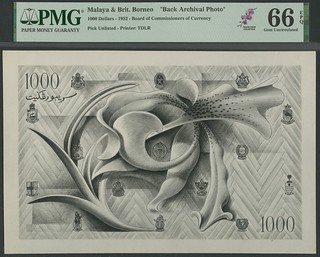
For collectors of numismatic ephemera, it's interesting to see that a grading company has slabbed photographs. Why not other ephemera? Perhaps it's only a matter of time until other ephemeral items become valuable enough in the marketplace to make slabbing worth the cost. -Editor
For more information, see:
THE FRANK GOON REFERENCE COLLECTION OF BRITISH MALAYAN BANKNOTES - PART ONE
(https://www.noonans.co.uk/auctions/calendar/698/)
https://www.noonans.co.uk/
NUMISMATIC NUGGETS: MARCH 19, 2023
Here's a selection of interesting or unusual items I came across in the marketplace this week. Tell us what you think of some of these. -Editor
Frederick II Double Ducat
ITALY
Mantua, Frederick II Gonzaga (1519-1540). Double ducat ND, Mantua.NGC MS 62 (6388816-001).
Av. FEDERICVS. II. M. MANTVAE. Head left.
Rev. FIDES. Mount Olympus surmounted by an altar.
MIR.442 - Fr.526; Gold - 6.83 g - 25 mm - 9 h
Top Pop: this is the only graded copy!
NGC MS 62 (6388816-001). Very rare type and of exceptional quality, with good centering and having barely circulated. Fine traces of breakage of the reverse corner visible. Superb at Fleur de Coin.
Above is a Google-translated description. From the MDC Monaco Auction 11 in April 2023. -Editor
To read the complete lot description, see:
https://www.biddr.com/auctions/mdcmonaco/browse?a=3376&l=3871109
1799 Associate Church Communion Token
New York--New York. 1799 Associate Church Communion Token. Lead or Pewter, Cast. Plain Edge. Very Fine.
23 mm x 17.5 mm, oval. Obv: Inscription ASSOCIATE / CHURCH within plain border. Rev: Inscription N. YORK with date 1799 below. Even pewter-gray coloration with only minor handling marks scattered about. Several casting flaws on both sides are as made and only involve the digits 99 in the date which, however, are fully appreciable. An appealing token and quite rare.
Indeed - while Scottish and other world communion tokens are relatively common, U.S. tokens are very rare. How do these compare in rarity to say, Albany Church pennies? From the Stack's Bowers Spring 2023 Auction Session 2 - Numismatic Americana & Early American Coins. -Editor
To read the complete lot description, see:
New York--New York. 1799 Associate Church Communion Token. Lead or Pewter, Cast. Plain Edge. Very Fine.
(https://auctions.stacksbowers.com/lots/view/3-11DQ8H/new-york-new-york-1799-associate-church-communion-token-lead-or-pewter-cast-plain-edge-very-fine)
Counterstamped 1919-S Buffalo Nickel
1919-S US Buffalo Nickel
Countermarked "ACME / DETROIT"
Issuer: Acme Company
Business/Profession: (unknown)
Date of issue: 1919 or later
Place of issue: Detroit, Michigan
From the eBay listings of Bob Merchant. 1919 is late for a counterstamp, and stamped coins of the twentieth century are harder to find. This one was likely used to test a stamping die used in manufacturing. -Editor
To read the complete lot description, see:
1919-S US Buffalo Nickel, Counterstamp "ACME / DETROIT"
(https://www.ebay.com/itm/134486578294)
Chiang Kai-shek 70th Birthday Medal
CHINA. Taiwan. 70th birthday of Chiang Kai-shek Copper Medal, Year 45 (1956). PCGS MS-65 Brown.
Diameter: 30mm. A great analog to the various commemorative coinage issues for Chiang Kai-shek, this red-brown Gem radiates with alluring underlying brilliance and a delightful matte nature.
Plain, but nicely executed. From the Stack's Bowers April 2023 Hong Kong Auction. -Editor
To read the complete lot description, see:
(t) CHINA. Taiwan. 70th birthday of Chiang Kai-shek Copper Medal, Year 45 (1956). PCGS MS-65 Brown.
(https://auctions.stacksbowers.com/lots/view/3-11WWF7/t-china-taiwan-70th-birthday-of-chiang-kai-shek-copper-medal-year-45-1956-pcgs-ms-65-brown)
1778 Massachusetts Codfish Note
MA-265. Massachusetts. October 16, 1778. 4 Shillings, 6 Pence. PCGS Banknote Gem Uncirculated 66 PPQ.
No. 5762. Signed by R. Cranch. Printed by Revere and Fleet, Boston, October, 1778. The top denomination note authorized by the October 16, 1778 act and one of the very few 66's graded for the entire series of 12 denominations. The Codfish engraving appears at top, with a lovely detail engraving of a pine tree gracing the back. These notes derive much of their appeal and popularity due to their association with Paul Revere who was responsible for printing the faces, while Thomas Fleet printed the backs. Almost certainly the finest-known example. PCGS Banknote Pop 1/None Finer.
A nice high-grade colonial note in the Stack's Bowers Spring 2023 Auction. -Editor
To read the complete lot description, see:
MA-265. Massachusetts. October 16, 1778. 4 Shillings, 6 Pence. PCGS Banknote Gem Uncirculated 66 PPQ.
(https://auctions.stacksbowers.com/lots/view/3-11DEA3/ma-265-massachusetts-october-16-1778-4-shillings-6-pence-pcgs-banknote-gem-uncirculated-66-ppq)
1886 $5 Silver Certificate
Fr. 263 $5 1886
Grade: PMG CH. UNC 63 PMG
Gorgeous silver dollar back with the large brown seal. Exceptional color and centering. Fresh and original.
Beautiful note of a popular, classic design. From the Lyn Knight Auctions March 30, 2023 sale. -Editor
To read the complete lot description, see:
http://www.lynknight.com/items/1189083
THE BOOK BAZARRE
WAYNE'S NUMISMATIC DIARY: MARCH 19, 2023
Thursday March 16, 2023 was a special day - after some morning meetings at my office I climbed back into my car and headed north to Baltimore for the Whitman Baltimore Expo. After parking and hiking over to the convention center I met up with Jim Haas for lunch. We walked over to the Pratt Street Ale House and were quickly seated.
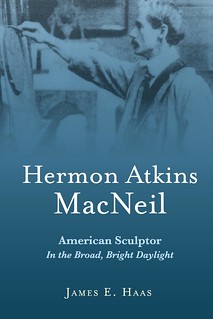 Jim authored the new book on the designer of the Standing Liberty Quarter: Hermon Atkin MacNeil: American Sculptor in the Broad, Bright Daylight . We talked about our respective careers and research interests, and I filled Jim in on the Eric P. Newman Numismatic Education Society (EPNNES) and the Newman Numismatic Portal.
Jim authored the new book on the designer of the Standing Liberty Quarter: Hermon Atkin MacNeil: American Sculptor in the Broad, Bright Daylight . We talked about our respective careers and research interests, and I filled Jim in on the Eric P. Newman Numismatic Education Society (EPNNES) and the Newman Numismatic Portal.
On our way back in to the convention center the first numismatists I spotted in the lobby were ANA President Ralph Ross and Redbook Editor Jeff Garrett. It was Jim's first visit to a coin show and I walked him around. We went to the far back corner to the exhibit area. There were four exhibits set up and we enjoyed reviewing the material. Exhibit chair Simcha Kuritzky buttonholed me to be a judge and I agreed. It had been many years since I'd judged at a show, but figured it's like riding a bicycle. Simcha gave me the forms amd reviewed some of the changes in recent years, but the process was pretty much as I'd remembered it.
Jim and I split up for a while and I visited some of our E-Sylum supporters. At the World Banknote Auctions table Dennis Hengeveld was working with a customer, but I introduced myself the WBNA's new Consignment Director Ryan Baum and had a nice conversation. I also got to meet Chris Victor McCawley and we discussed E-Sylum advertising.
Over at Jon Sullivan's table the error dealer was talking with Dave Wnuck. We talked about The E-Sylum and some great error coins in Jon's inventory. One standout for me was a 50% off-center Morgan dollar - great coin. He also had a double struck Standing Liberty Quarter and I later told Jim Haas about it.
I hooked back up with Jim Haas and we found Len Augsburger at literature dealer Charlie Davis' table. Sharing Charlie's table as usual was Neil Musante and I introduced him to fellow author Jim and they had a nice conversation. Also there were E-Sylum contributor Greg Bennick and his coin-collecting father Dave.
Next Jim, Len and I went out to the lobby for a beverage and Jim and Len discussed potential projects for Newman Grants. Joining our table was Kerry Wetterstrom, and he and I discussed the recent arrest over falsified coin pedigrees.
Back on the bourse floor I met with other E-Sylum supporters including Doug Winter and Harry Laibstain. Jeff Garrett and I talked about the new PCGS designation of Confederation-era colonial coins (see the article elsewhere in this issue). Along the way I also ran into and spoke with Dave Schenkman and NBS Board members Dave Steine.
I caught up with Greg Bennick again at John Kraljevich's table, where he was examining a nice Houck's Panacea counterstamp on a Bust Half Dollar. I told Greg about some of the diagnostics I look for on counterstamps. The coin was from the Brunk collection and Greg later decided to purchase it.
I could only wave to other folks like Julian Leidman who were busy with customers. I ran short on time and missed many others such as Wayne Herndon and Bob Rhue. At least I should get to see Wayne at my upcoming Nummis Nova dinner.
I stopped by John Dannreuther's table and he told me about his new book on proof nickels and showed me some nice hi-res images of photos taken at the Second Philadelphia Mint.
Dies, Dies, Dies!
Back at John Kraljevich's table I sat down and spoke with NBS Board member Roger Siboni before meeting up with Heath White who'd come into the show with a rolling cart of heavy cargo - three boxes of dies!
These large blocks of metal are HEAVY and we should have been wearing steel-toed safety shoes as we examined them at a nearby empty dealer table. But my morning pushups and arm curls served me well and nothing dropped to the floor. One after another I marveled at the amazing workmanship on these one-of-a-kind utilitarian works of art, some dating back to the War of 1812 and directly connected to some famous names including Joseph Merriam and Anthony Paquet.
Heath writes:
"In 1851 the U S Army Regulation for their eagle belt buckle changed. This required the companies manufacturing these buckles to have new dies engraved. The William H Horstmann & Sons Company (Philadelphia) was one of the largest manufacturers of military goods at the time and they had two dies made. One by Anthony C Paquet and one by Frederick C Key & Sons. The die pictured is the die engraved by Anthony C Paquet.
"Horstmann's company records showing the purchase of this die from Paquet are at the Historical Society of Pennsylvania. The records show the die was purchased in December 1851 at a cost of $56.25; altered by Paquet in 1853 for $4; and the wreath design was added to the die in December 1854 for $12. Prior to 1854 the wreath was stamped separately and applied to the eagle buckle.
"The corresponding entries in Horstmann's company records are as follows."
Wow!
Exhibits
When I couldn't procrastinate any longer I headed back to the exhibit area to begin my judging. There I saw my old friend and fellow judge Tom Uram of the Pennsylvania Association of Numismatists. He was just wrapping up his work, and before he left we discussed the upcoming ANA convention in Pittsburgh.
After judging I made another pass by Charlie Davis' table as I hadn't actually gotten to talk with him before. Soon the bourse would close and I headed to the lobby.
Dinner
After a short call to my wife I met up with Len, Greg and Dave. Greg pulled his car around and drove us to La Scala restaurant in Baltimore's Little Italy where we met with Heath White and his son Miklos.
Dinner conversation included introductions, hobby interests, the show, Greg's recent interviews of numismatic personalities for the Newman Portal, The E-Sylum and more.
Greg and Dave Bennick, Wayne Homren, Len Augsburger, Heath and Miklos White
It had been a great afternoon and evening. Greg dropped me off near my parking garage on the way to drop Len at his hotel. I made it home to Virginia by around 10pm. My feet and back were still sore, but it was all well worth it. What a great time visiting with numismatic friends.
COIN WITH OLDEST DEPICTION OF TEMPLE MENORAH
Howard Berlin passed along this article from The Times of Israel about the display of a coin with the oldest-known depiction of the Temple menorah. Thank you. -Editor
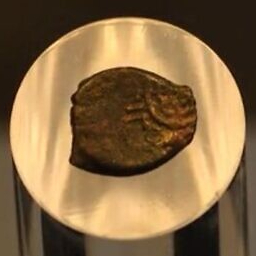 An ancient coin bearing the oldest-known depiction of the Temple menorah will go on display to the public for the first time on Monday with the opening of the recently renovated Davidson Center in Jerusalem's Old City.
An ancient coin bearing the oldest-known depiction of the Temple menorah will go on display to the public for the first time on Monday with the opening of the recently renovated Davidson Center in Jerusalem's Old City.
The coin dates to around 40 BCE, during the Roman times and the reign of the last Hasmonean king. This is the oldest known artistic depiction of the menorah, created 107 years before the destruction of the Second Temple,
says Dr. Yuval Baruch, head of archaeology and administration at the Israel Antiquities Authority, who was one of the excavators of the site and led the archaeological curation of the Davidson Center. The coin was donated to Israel sometime during the 1940s, during the British Mandate period, and it's unclear where or when it was found.
It's part of an exhibit of rare artifacts that contain some of the earliest known references and research about the origin of the Temple menorah, a seven-branched candelabra that is also used as the symbol of the modern State of Israel. Next to the coin is the Magdela Stone , which was discovered in the town of Migdal in 2009 and was likely a Torah reading table from a first-century synagogue. The intricately carved stone shows multiple menorahs as well as a possible depiction of the Jerusalem Temple.
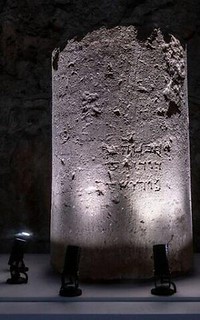 Also being displayed to the public for the first time is a piece of plaster from Jason's Tomb, a carved-rock tomb from the Second Temple period nestled into the leafy Rehavia neighborhood in Jerusalem. There are five menorahs carved into the plaster, which was discovered in the 1950s during the excavation of the tomb prior to building an apartment building.
Also being displayed to the public for the first time is a piece of plaster from Jason's Tomb, a carved-rock tomb from the Second Temple period nestled into the leafy Rehavia neighborhood in Jerusalem. There are five menorahs carved into the plaster, which was discovered in the 1950s during the excavation of the tomb prior to building an apartment building.
The three pieces were chosen as the centerpiece of the newly opened Davidson Center, which will open to the public on Monday after a three-year closure due to renovations. The multi-million dollar overhaul doubled the size of the museum and visitor's center, which is located in the Jerusalem Archaeological Park in the Old City.
To read the complete article, see:
Coin with oldest depiction of Temple menorah displayed for first time
(https://www.timesofisrael.com/coin-with-oldest-depiction-of-temple-menorah-displayed-for-first-time/)
VIKING GOLD BRACTEATE OF ODIN
The Vindelev hoard includes a bracteate with the oldest reference to the Norse god Odin. -Editor
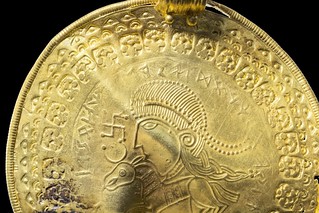 A centuries-old gold disc found in Denmark has revealed the earliest known mention of the Norse god Odin at least 150 years earlier than any previous inscription.
A centuries-old gold disc found in Denmark has revealed the earliest known mention of the Norse god Odin at least 150 years earlier than any previous inscription.
The disc, known as a bracteate, was unearthed in a treasure trove in Vindelev, central Denmark, in 2020, alongside Roman coins that had been reworked into jewelry.
It was displayed to the public at a museum near the discovery site and only recently made available to academics who were able to establish its significance.
Odin is one of the primary gods of Norse mythology, a pre-Christian pagan belief system central to Viking society.
This is the smoking gun for Odin's presence in Scandinavia as early as the 5th century,
Simon Nygaard, an assistant professor in pre-Christian Nordic religion at Aarhus University in Denmark, told NBC News on Wednesday. In the proper sense of the word, it's historic.
Nygaard, who was consulted about the interpretation of the inscription on the bracteate, added that finding a runic inscription that includes Odin's name was spectacular.
Before the Vindelev hoard's discovery, the oldest mention of Odin was a brooch found in southern Germany from the latter half of the 6th century.
The disc features an inscription: He is Odin's man,
said Krister Vasshus, a linguist who helped to decipher the runic inscription. He added that it also features a name or nickname Jaga
or JagaR,
who was likely the king or ruler of the place where the bracteate was made.
The carver knew exactly how to shape the runes to make them perfect, simply perfect,
he added. They are exquisite.
The bracteate also displays a swastika, an ancient symbol used throughout the Iron Age and later co-opted by German nationalists and Adolf Hitler's Nazi Party.
To read the complete article, see:
Viking treasure reveals oldest reference to Norse god Odin
(https://www.nbcnews.com/news/world/norse-god-odin-oldest-reference-found-viking-treasure-rcna73939)
NETHERLANDS DETECTORIST UNEARTHS COIN HOARD
Paul Horner passed along this story of a coin find in the Netherlands. Thanks. -Editor
A treasure trove of medieval artifacts lay buried beneath the ground in a small city in the Netherlands for centuries.
Then a man equipped with a metal detector and a sense of curiosity discovered it.
Historian Lorenzo Ruijter, 27, unearthed a cache of 1,000-year-old gold pendants and silver coins in the Dutch city of Hoogwoud in 2021, according to Reuters.
The treasure consisted of four crescent-shaped pendants, which were likely worn as earrings, two segments of gold leaf and 39 silver coins, according to a March 9 news release from the Dutch National Museum of Antiquities.
The trove was likely buried around 1248 A.D., according to the museum. This period during the High Middle Ages in the Netherlands was characterized by frequent violence.
Gold jewelry from this era is rare, according to the museum, making the find an important discovery.
To read the complete article, see:
Rare treasure buried during medieval wars unearthed by historian with metal detector
(https://www.yahoo.com/news/rare-treasure-buried-during-medieval-192606549.html)
MEDAL OF HONOR MUSEUM TO EXPAND
The Medal of Honor Museum near Charleston, SC recieved a donation to enable it to expand. -Editor
The Medal of Honor Museum recently received a $3.5 million donation to expand the museum by 25,000 square feet, allowing for more stories to be shared.
"To our heroes who are here today and those who couldn't join us, Mount Pleasant is honored to be your home, the home of the Medal of Honor," Mount Pleasant Mayor Will Haynie said. "Our dedication to honoring your gallantry and your selflessness will never falter or never fail.
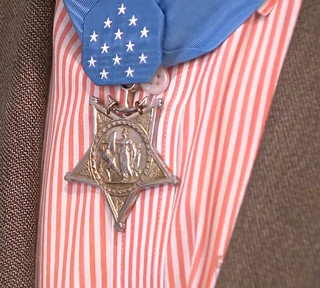 The impact goes beyond the museum - the money will also go towards a program developing future leaders.
The impact goes beyond the museum - the money will also go towards a program developing future leaders.
"We developed a Medal of Honor leadership-based program that teaches all of us to meet your moment, just as the 35 hundred plus have bravely done," said Tom McQueeney the board chair of the Leadership and Education Center.
The hope is that the legacy of the Medal of Honor recipients is remembered by future generations.
"When I was a kid growing up, I didn't know any Medal of Honor recipients," said Ryan Pitts, a Medal of Honor Recipient. "My kids are growing up knowing me, they've come here and gotten to walk through the museum. I think anything we can do to bring it to the next generation as they're coming up behind us to see that everybody that came before them, we were people just like them.
Pitts received his Medal of Honor fighting while wounded in Afghanistan in 2008. He hopes the expanded museum will help teach courage on or off the battlefield.
To read the complete article, see:
Patriots Point Medal of Honor Museum receives $3.5M donation
(https://abcnews4.com/news/local/patriots-point-medal-of-honor-museum-receives-35-million-donation-leadership-education-center-patriots-point-wciv)
The last I'd heard of the Medal of Honor Museum was when plans for it were announced in 2012. Glad to see it's up and running. Have any of our readers visited it? Here's some information from their web page. -Editor
THE MEDAL OF HONOR MUSEUM IS LOCATED ON BOARD THE HISTORIC AIRCRAFT CARRIER USS YORKTOWN.
The Medal of Honor Museum features interactive exhibits that tell the stories of the brave Americans who have served and protected the U.S. with remarkable courage.
The Medal of Honor Museum pays special tribute to American heroes who made the ultimate sacrifice, ranging from the very first Medal of Honor recipients during the Civil War all the way to the War On Terror in Iraq and Afghanistan. It is also home to the Congressional Medal of Honor Society. Society members share the distinct honor of wearing our nation's highest award for military valor.
For more information, see:
MEDAL OF HONOR MUSEUM
(https://www.patriotspoint.org/explore/medal-of-honor-museum/)
To read the earlier E-Sylum article, see:
NEW MEDAL OF HONOR MUSEUM PLANNED IN CHARLESTON
(https://www.coinbooks.org/esylum_v15n33a06.html)
LOOSE CHANGE: MARCH 19, 2023
Here are some additional items in the media this week that may be of interest. -Editor
Arthur Shippee passed along this Artnet story of a Byzantine coin find in Germany. -Editor
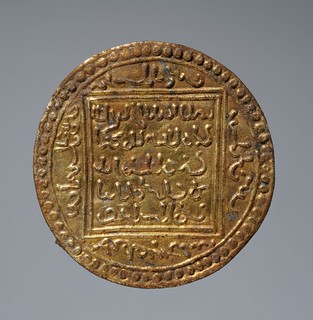
The hoard consisted of two very high quality gold earrings set with semi-precious stones, a gilded pseudo-coin brooch, two gilded stone-studded finger rings, a ring fragment, a small formerly gilded perforated disc, a ring brooch, and about 30 silver coins, some of them heavily fragmented,
Ulf Ickerodt, the director of ALSH, told Live Science.
The team has dated the two earrings, surprisingly well-preserved, to around 1100 due to their apparent Byzantine style and craftsmanship. One of the brooches is also an imitation of an Islamic gold dinar, dating it to the Almohad caliphate between the 12th and 13th centuries.
The 30 coins are linked to the reign of Valdemar II, the Danish king who ruled from 1170 to 1241. Fragments of fabric found with the coins suggest that they were once buried in a bag.
To read the complete article, see:
A German Man Just Learning How to Use a Metal Detector Uncovered a Hoard of Buried Byzantine Jewelry and Silver Coins
(https://news.artnet.com/art-world/trainee-metal-detectorist-gold-silver-hoard-germany-alsh-2267848)
Collectors appreciate history and tradition. Here's a story about something round and made of metal, but much bigger than coins or medals. Watervliet Arsenal has made big guns for every U.S. conflict since the Spanish-American War. Russia has made it relevant again, as described in this Wall Street Journal article. -Editor
On a military base more than two centuries old, the Army is hammering out its cannon of the future.
The Watervliet Arsenal opened during the War of 1812 and one building dates to 1828. Yet inside an aging production hall, new digital machine tools that resemble science-fiction space pods are churning out components for Abrams tanks, a weapon pledged for fighting in Ukraine. In another hall, an automated forge pounds red-hot metal cylinders into 20-foot gun barrels for America's next howitzers, which will lob shells more than 40 miles.
Fighting in Ukraine has renewed attention to land systems that Watervliet helps produce and repair, which until recently were dismissed by some military strategists as relics because they are used by traditional infantry.
Tacom, the Army's in-house production, maintenance and logistics operation for ground equipment like artillery, is unusual because it carries out manufacturing. The Pentagon and Congress decided decades ago that to ensure supplies of essential materiel like big guns and their ammunition, some production and upkeep will remain in public hands.
Col. Fisher's arrival was marked by a unique tradition: a ceremony to hand off the stamp with which the base commander's initials imprint every barrel.
What we do here we've been doing since 1813,
said Gen. Werner. What's going on in Ukraine is a manifestation of what we've been doing for 210 years.
To read the complete article (subscription required), see:
At a Steam-Age Arsenal, U.S. Army Forges Cannons for a Digital Era, War in Ukraine
(https://www.wsj.com/articles/at-a-steam-age-arsenal-u-s-army-forges-cannons-for-a-digital-era-war-in-ukraine-68e51440)
This one is non-numismatic as well, but of interest to history buffs and collectors in general. It's about Robert K. Wittman recovered an estimated $300 million worth of stolen artworks and historical relics, including an original copy of the Bill of Rights. Thanks to Heath White for passing this along. -Editor
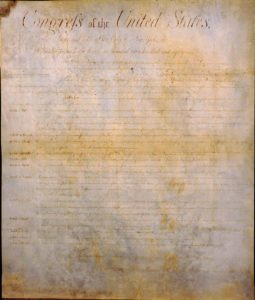 Raised in Baltimore where his father was a high-end antiques dealer, Wittman began working for the FBI in the late 1980s and eventually focused on investigating theft of cultural items. The marketing of stolen goods would become much easier, thanks to the development of internet auctions allowing thieves to effortlessly find buyers and make lucrative sales with relative anonymity. This is especially so in the booming business of Civil War collectibles, where items either pilfered from museums or swindled from families and private collectors sometimes command millions of dollars.
Raised in Baltimore where his father was a high-end antiques dealer, Wittman began working for the FBI in the late 1980s and eventually focused on investigating theft of cultural items. The marketing of stolen goods would become much easier, thanks to the development of internet auctions allowing thieves to effortlessly find buyers and make lucrative sales with relative anonymity. This is especially so in the booming business of Civil War collectibles, where items either pilfered from museums or swindled from families and private collectors sometimes command millions of dollars.
Tracking down stolen historical treasures and busting those who traffic in them requires a special touch, as Wittman describes in his 2010 book Priceless. His story proves that he was a natural for the job.
In the 1990s, Wittman handled numerous investigations involving everything from combat-worn uniforms and presentation weapons to personal correspondence from Union and Confederate soldiers. In each instance, the evidence led to swindlers, thieves, and unscrupulous collectors who were motivated by greed rather than a love of history.
To read the complete article, see:
BUSTED! A DEDICATED FBI AGENT RESCUED TREASURED CIVIL WAR ARTIFACTS FROM THIEVES, SWINDLERS, AND UNSCRUPULOUS COLLECTORS
(https://www.historynet.com/busted-dedicated-fbi-agent-rescued-treasured-civil-war-artifacts/)
But there is a numismatic connection... -Editor
Heath adds:
"The company hired by the ANA to research and recover its stolen coins was the consulting company started by Robert Wittman after he left the FBI. I would say this is ironic, but the more I research different fields of collectibles the more I find they are very similar in many ways."
CASPAR WISTAR'S ODD COLLECTION
Another good read for the collectors in all of us is this Washington Post piece published today about the strange medical artifacts a man inherited long ago from his aged godmother. -Editor
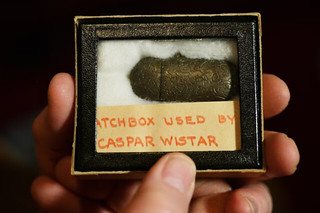 In decades of covering campaigns, I've seen plenty of historical relics: collections of rare buttons and bumper stickers, boxes full of yellowing convention passes. But none of that prepared me for the morning last fall when my dog was running around with her pack of neighborhood playmates, and my friend Ledge turned to me and asked a question so bizarre that for a moment I was sure I'd misheard him.
In decades of covering campaigns, I've seen plenty of historical relics: collections of rare buttons and bumper stickers, boxes full of yellowing convention passes. But none of that prepared me for the morning last fall when my dog was running around with her pack of neighborhood playmates, and my friend Ledge turned to me and asked a question so bizarre that for a moment I was sure I'd misheard him.
Hey,
he said, did I tell you I have John Marshall's gallstones?
I suppose someone who lived in a normal city, maybe Akron or Omaha, would have nervously laughed off Ledge's question and started talking to someone else. But in Washington, where we practice what Abraham Lincoln called our political religion,
we cling to creepy totems, proof that the Founding Fathers and their celebrated successors once walked among the living.
Sometimes those relics come in the form of a wrinkled diary or a presidential Bible, stored in backrooms at the Library of Congress. Other times they come to us through medical waste.
At this point, you should probably understand that, despite being one of the least pretentious people I know in Washington, Ledge is the progeny of one of America's oldest and most accomplished families. His given name is Ledyard Stevens Rhinelander King, and his ancestors include Peter Stuyvesant, the last Dutchman to oversee New York, and the Puritan minister Roger Williams, who founded Rhode Island, along with three witnesses to the Magna Carta. Another relative, Gen. Ebenezer Stevens, served on the Marquis de Lafayette's staff and is depicted in a painting in the Capitol Rotunda.
It was hard to make sense of the objects we pulled from Aunt Judy's box as we sat at Ledge's kitchen table. There was an ancient portable writing desk, inside of which we found a pair of glasses that probably dated back to the 1700s. There was a giant metal key to one of Philadelphia's first jails and a shard of wood from the tree where William Penn signed his treaty with the Lenape tribe in 1683.
The only hint as to the provenance of these things — including a lifelike heart made in the 1700s by Abraham Chovet, a French pioneer in anatomical models — was that much of it seemed connected to Caspar Wistar, an 18th century Philadelphia doctor. Wistar wrote the first anatomy textbook in America. His great-nephew Isaac, a lawyer and Civil War general, endowed the Wistar Institute in Philadelphia, housing a museum for rare medical artifacts.
Some of those artifacts, it seemed, had found their way to Aunt Judy's shabby apartment. But how?
To read the complete article, see:
My neighbor found Lincoln's hair in his basement. I found a mystery.
(https://www.washingtonpost.com/opinions/2023/03/14/lincoln-marshall-family-legacy-mystery/)
FEATURED WEBSITE: TOKEN CORRESPONDING SOCIETY
This week's Featured Web Site is the Token Corresponding Society.
The word ‘token' in this context means a coin or similar object which is issued for use in place of regular or official coinage. Members' interests include the classical series of 17th, 18th and 19th century tokens along with a whole range of coin-like objects which are collectively known as ‘Paranumismatica' i.e. outside the scope of formal Numismatics consisting of Tokens, Tickets, Passes, Jetons, Historical Medals and Medallions.
The Token Corresponding Society is the Society for collectors and enthusiasts of tokens and associated paranumismatica. Dedicated to researching and cataloguing all things tokens, both historic and recent.
The Society publish a quarterly Bulletin and organise an annual Congress as well as offering a unique network of likeminded token collectors, researches and dealers.
For non-members we welcome requests for help in identifying tokens. Please contact us if you feel we can help.

